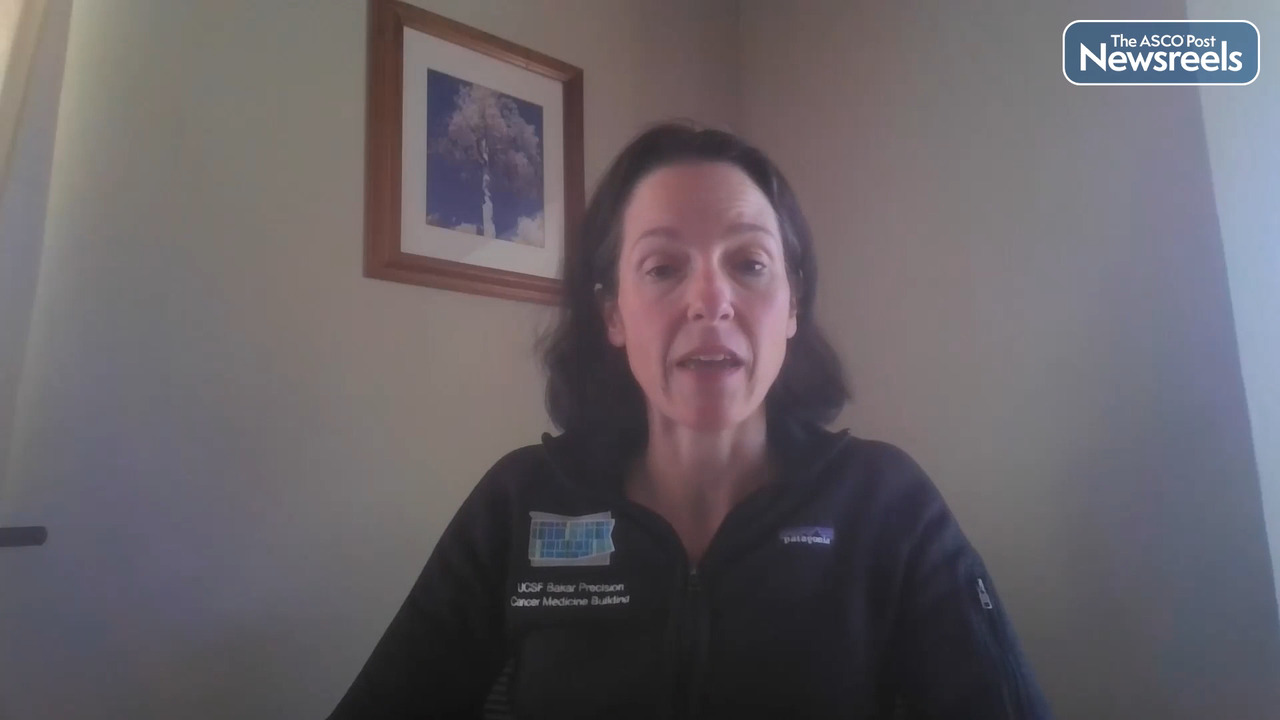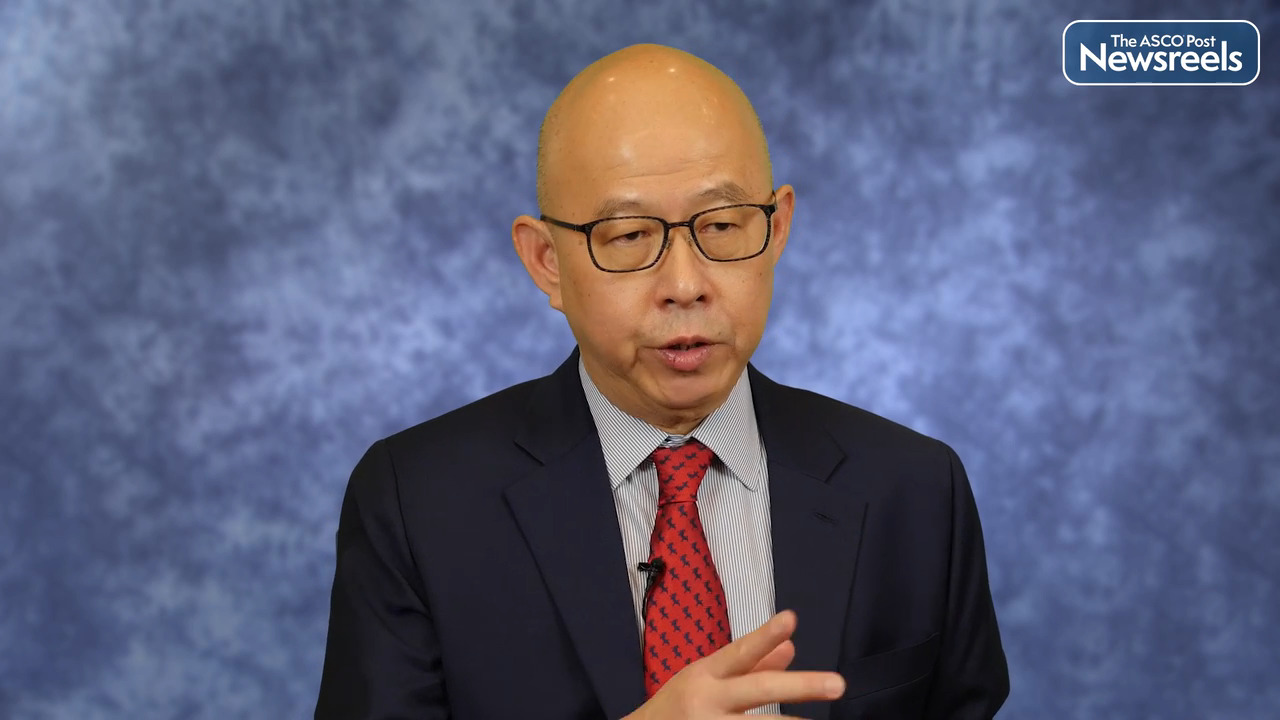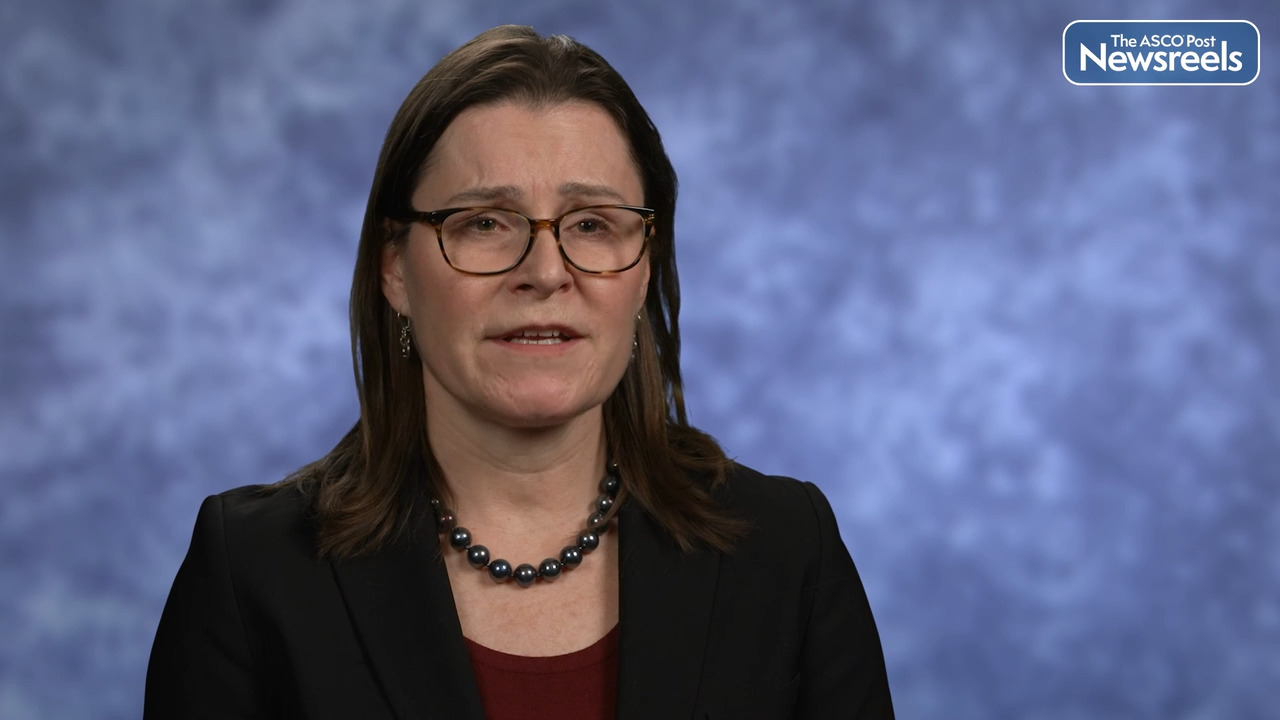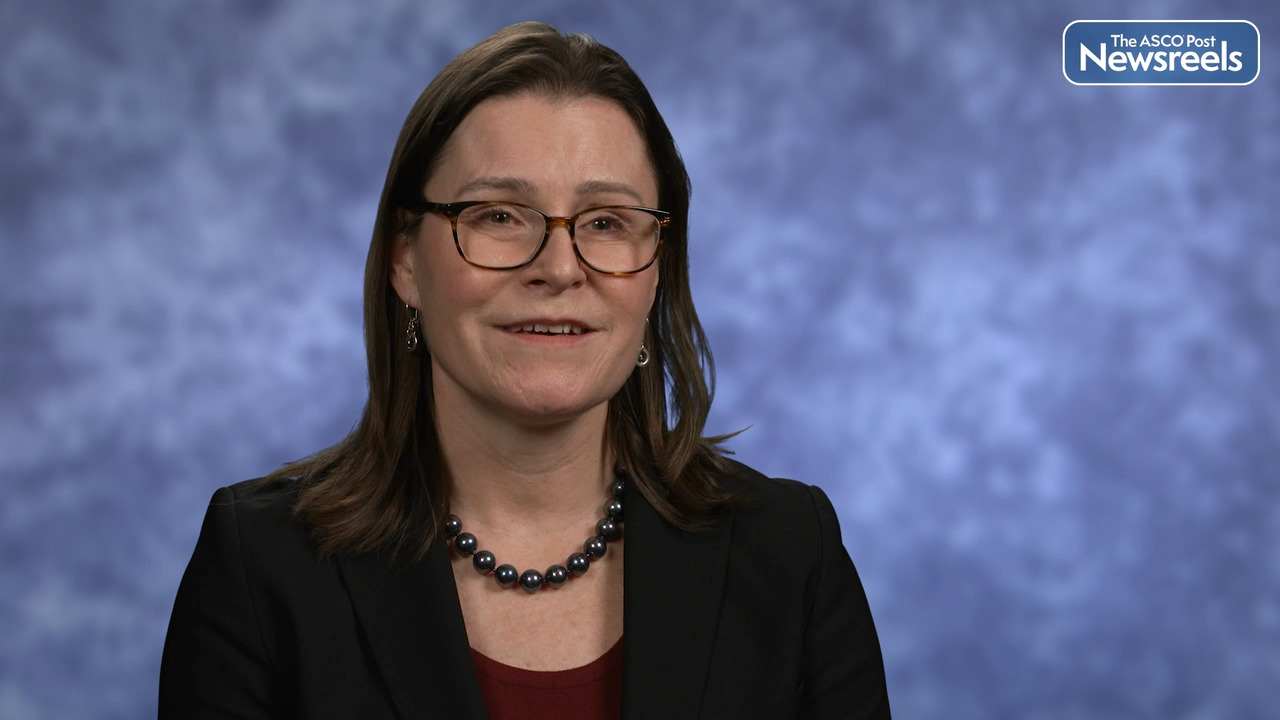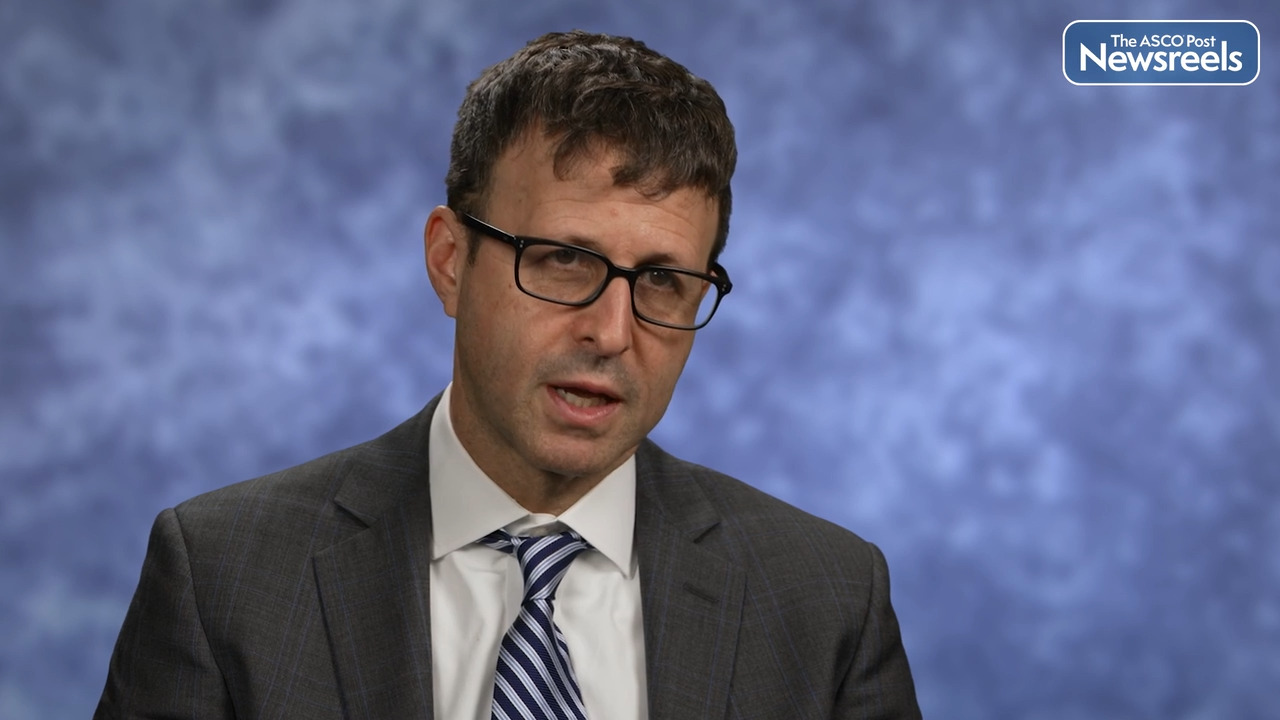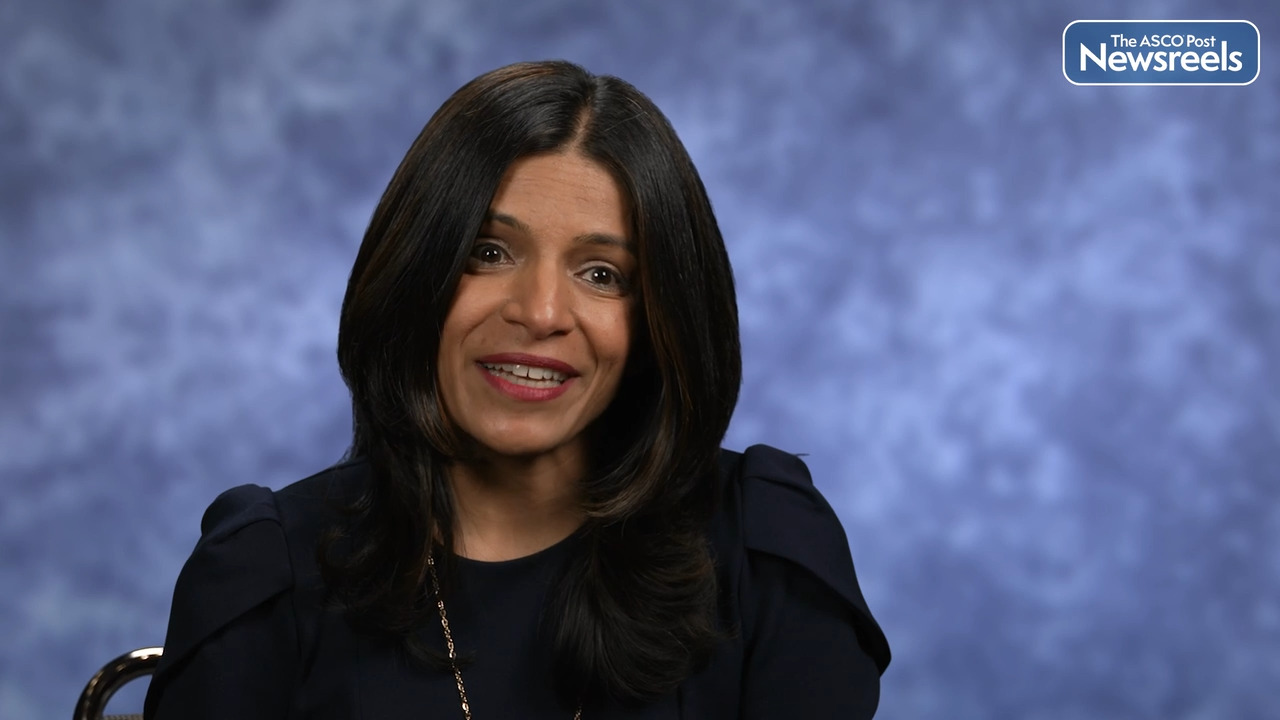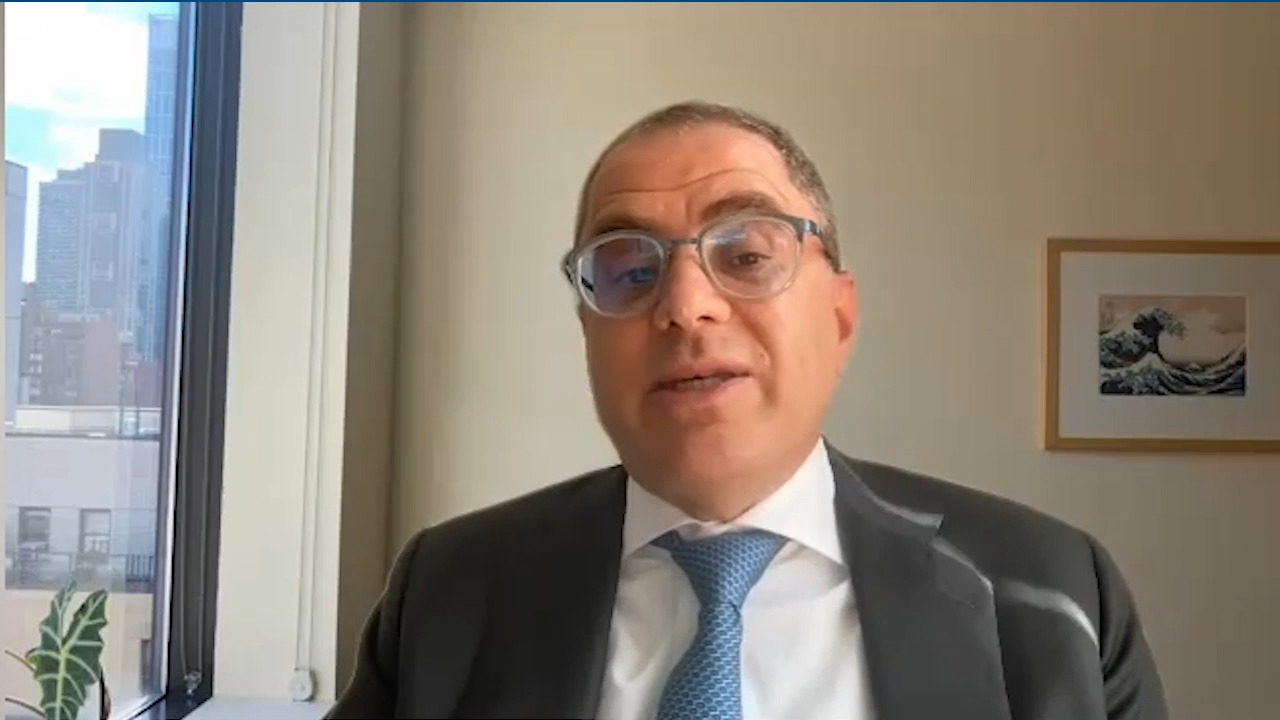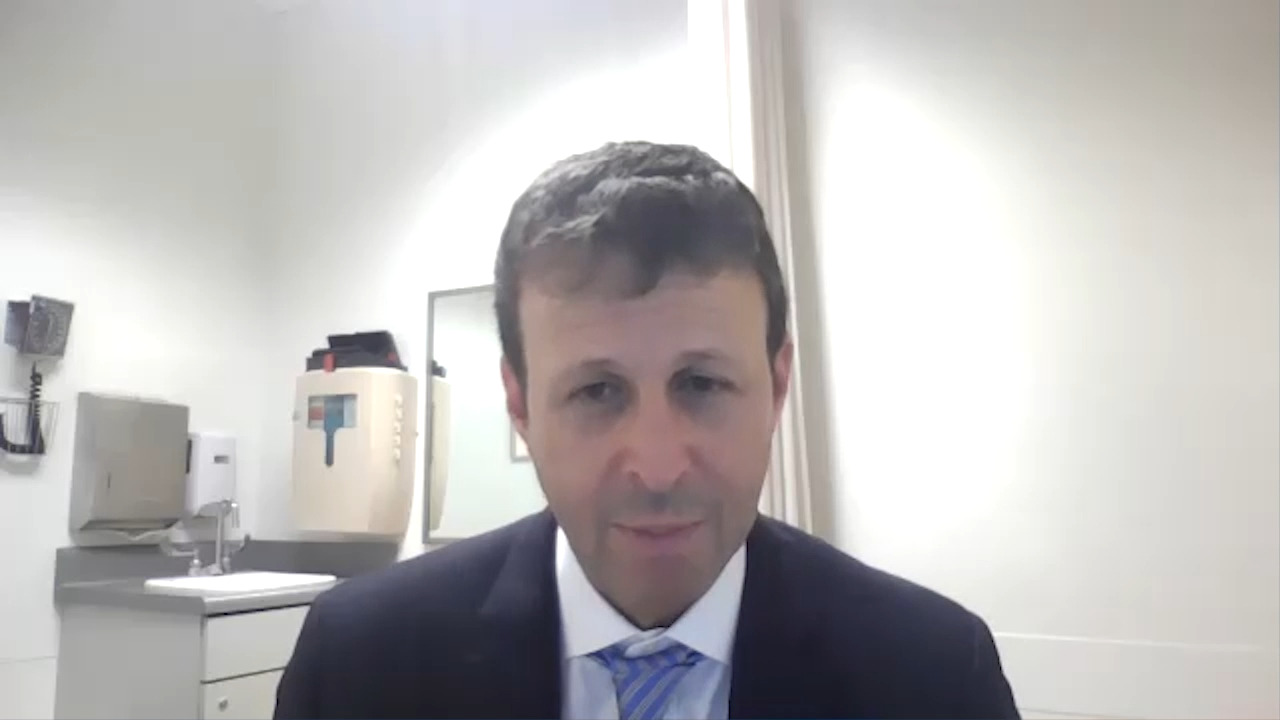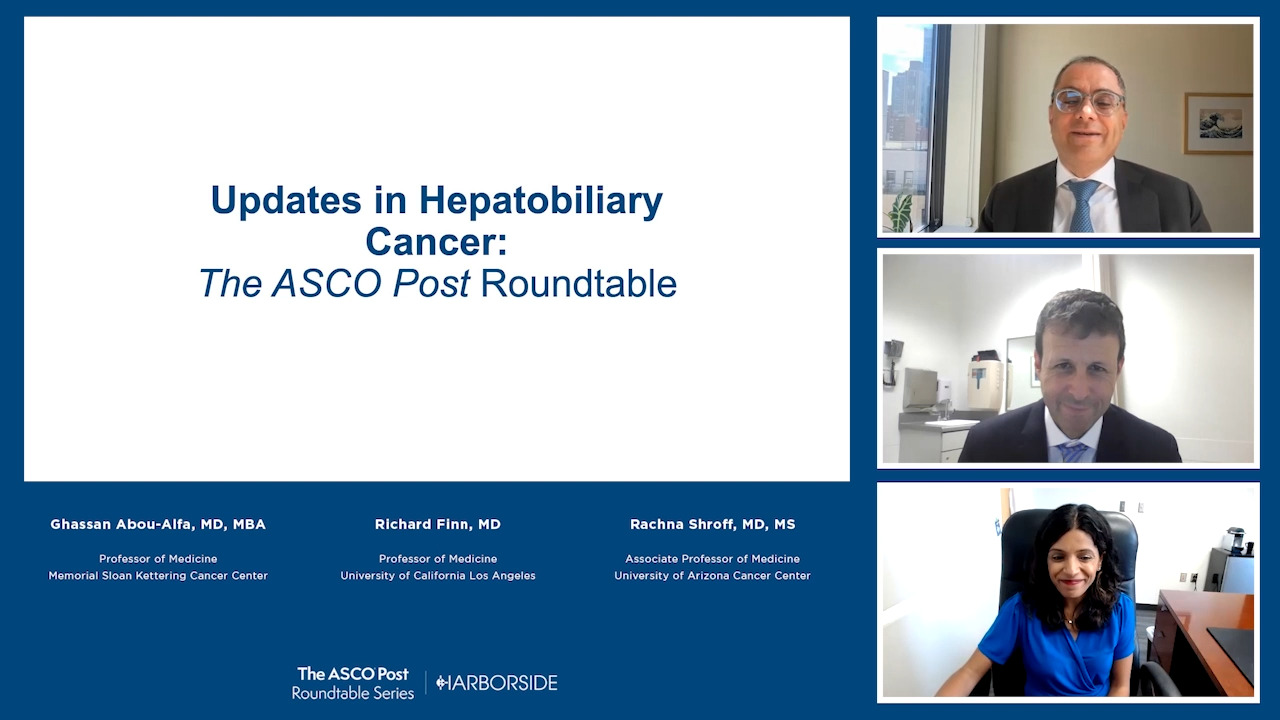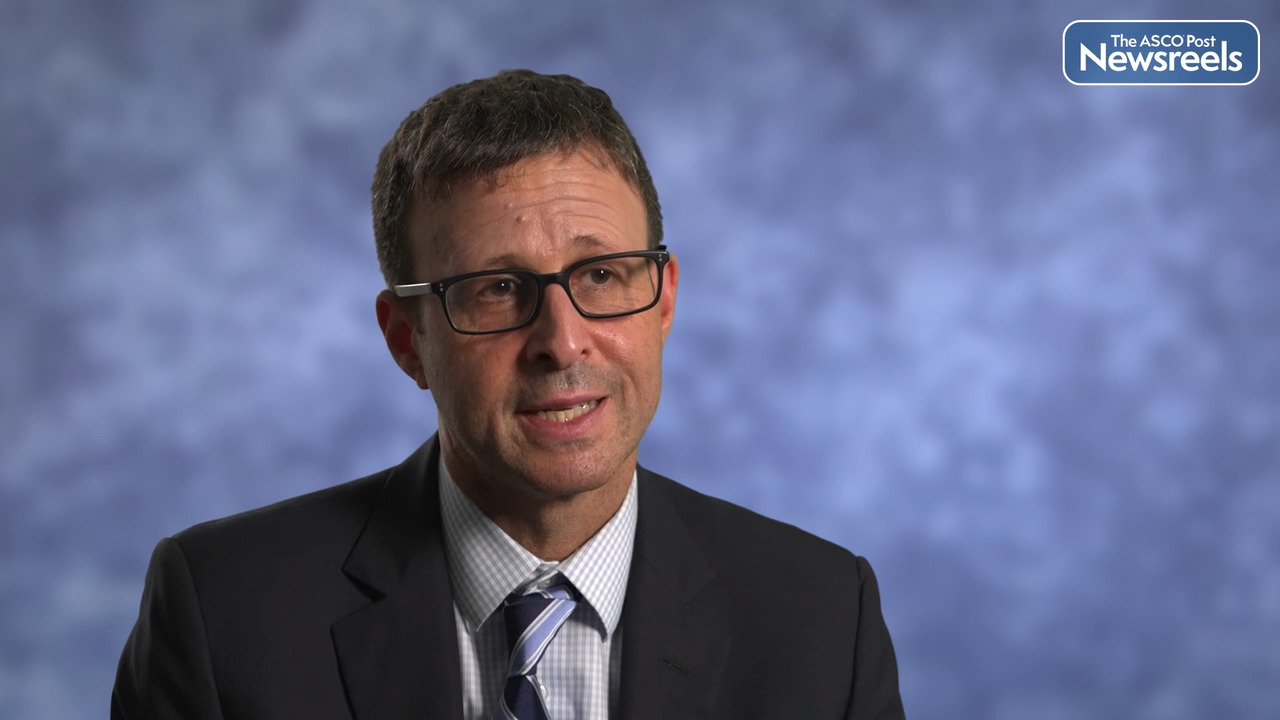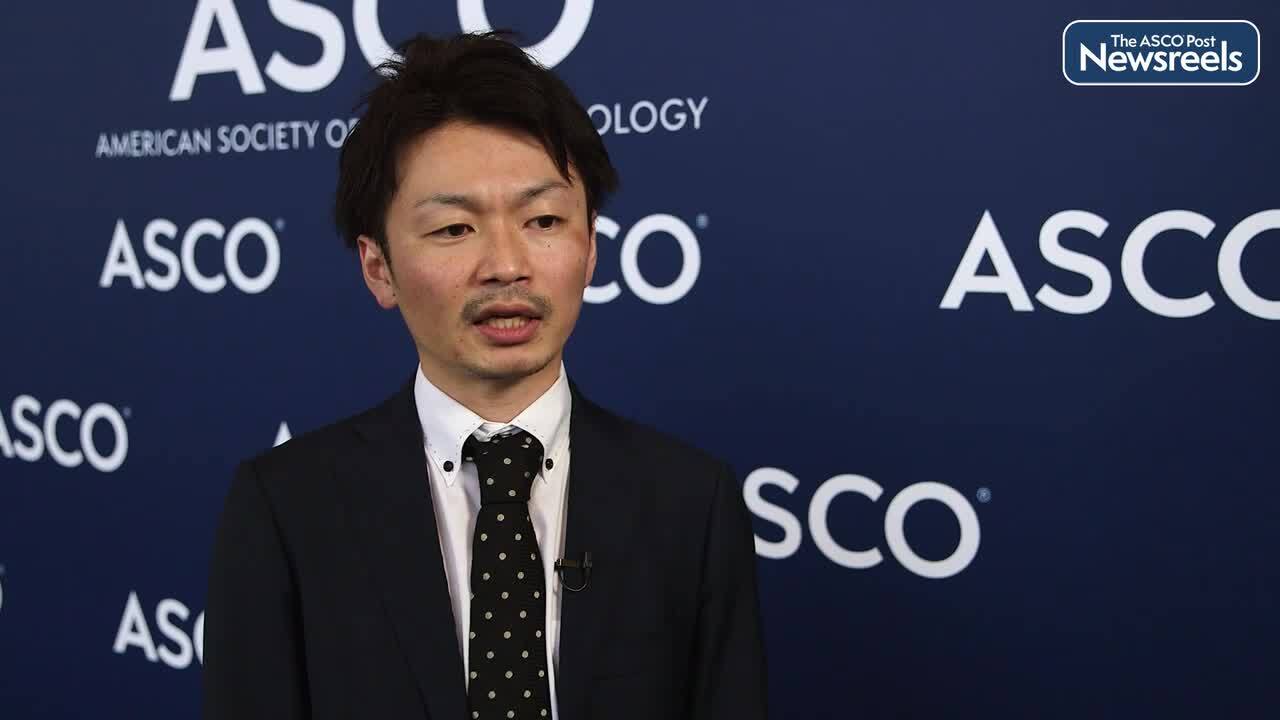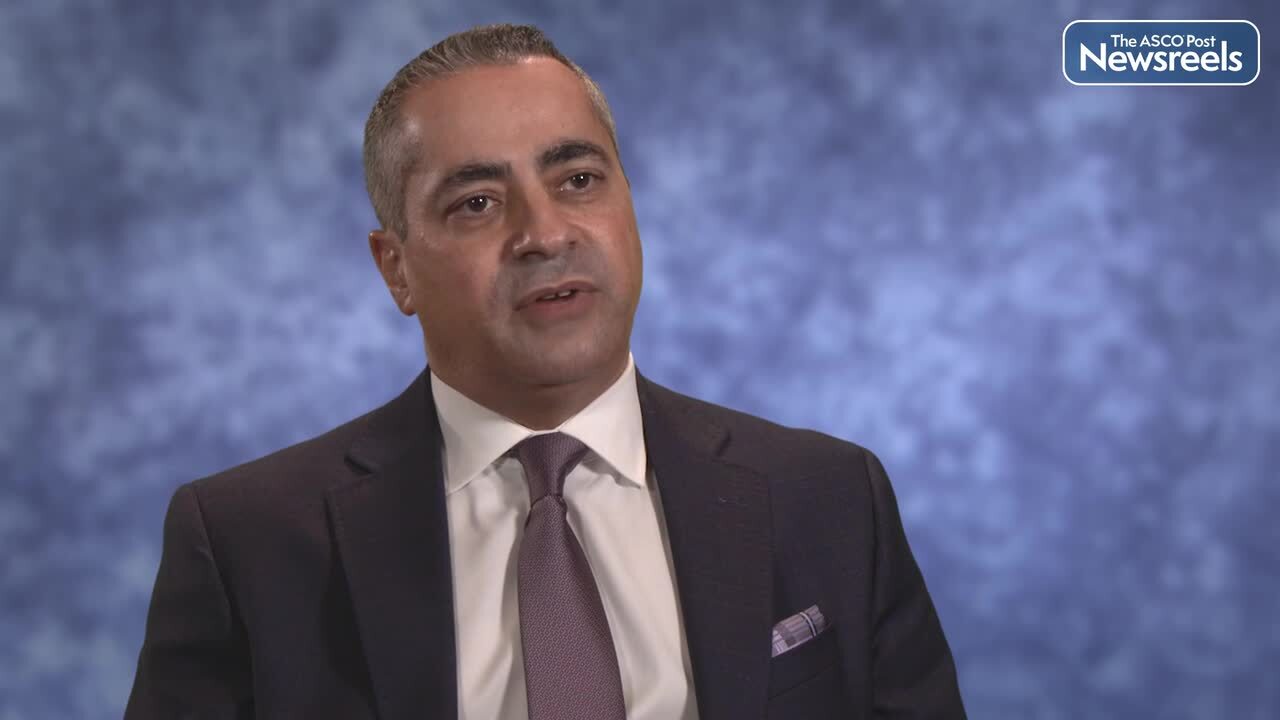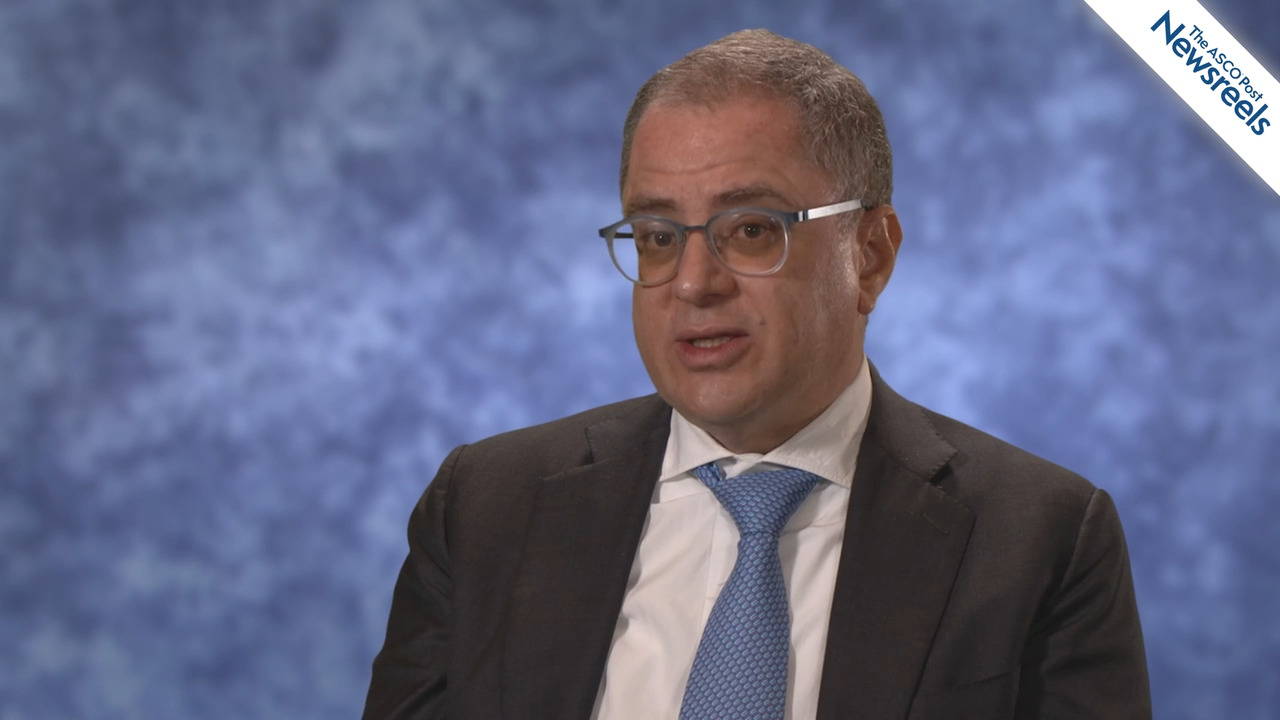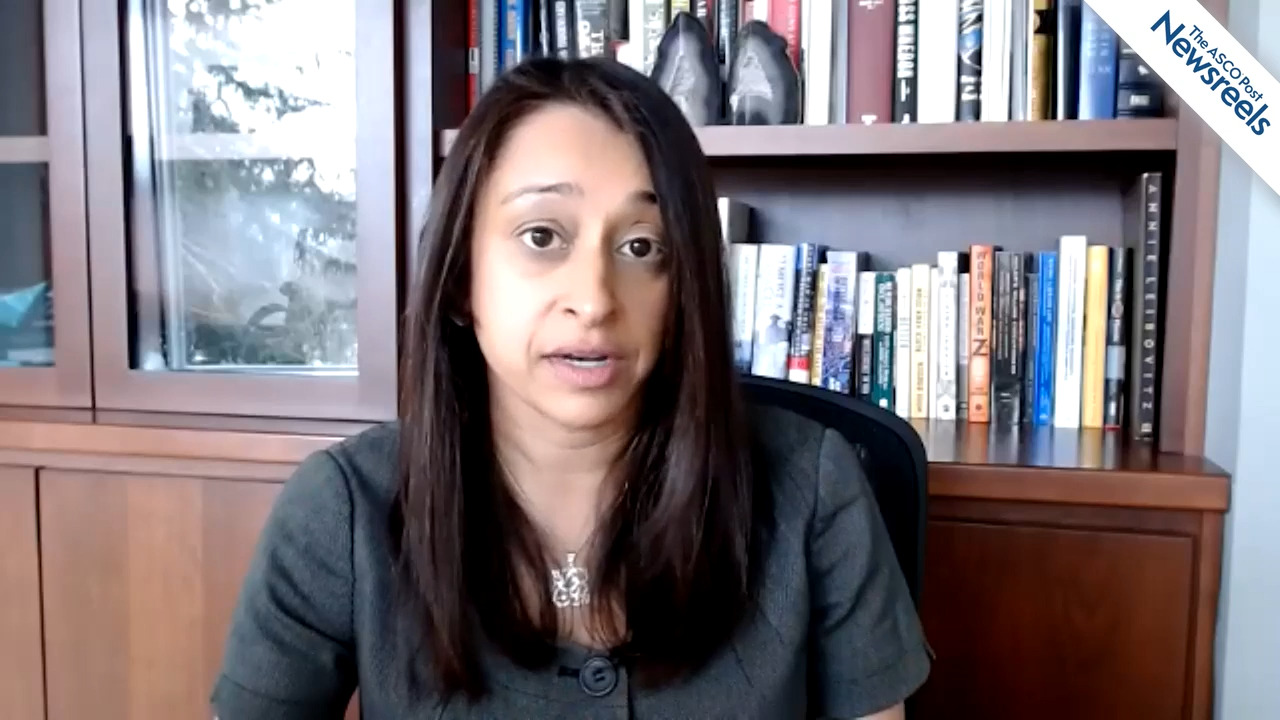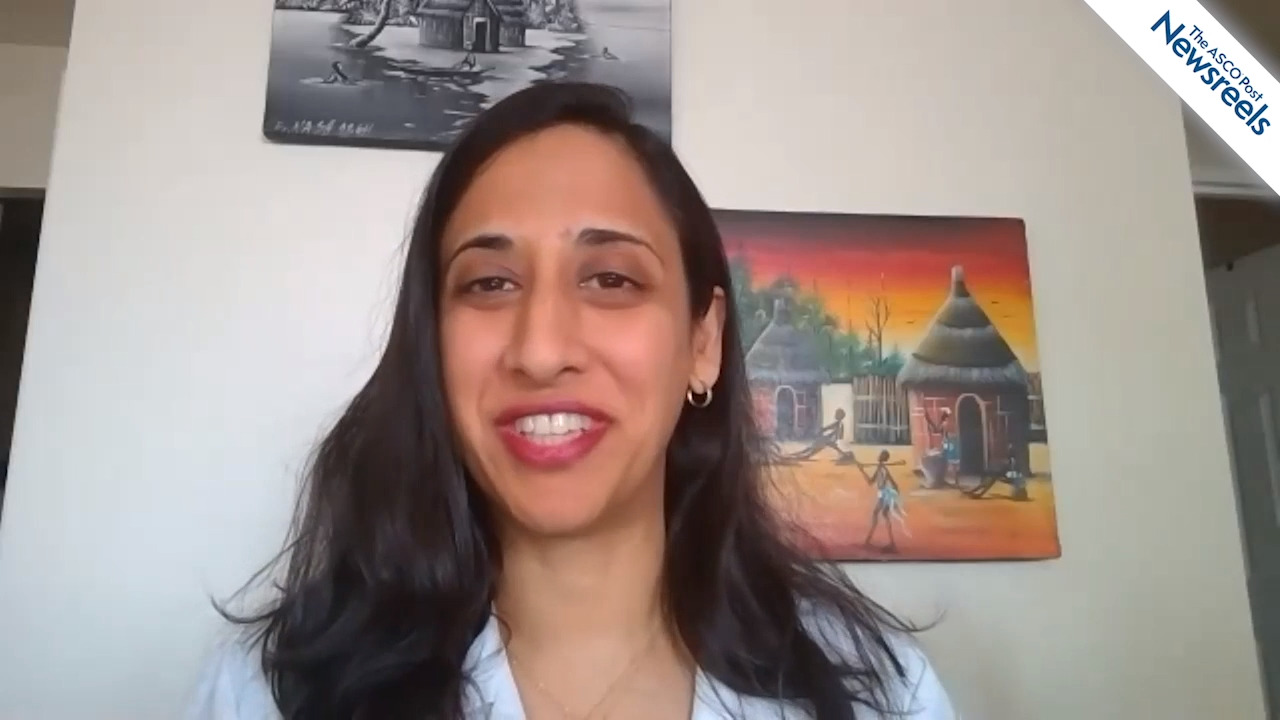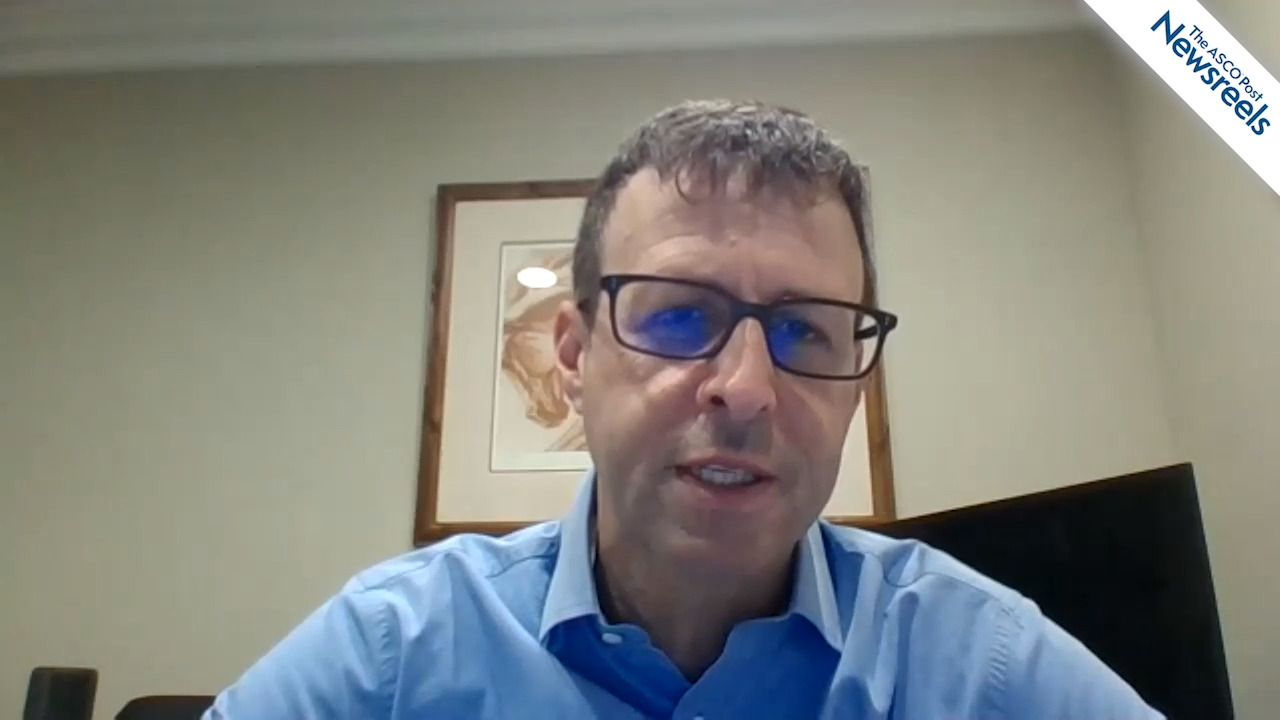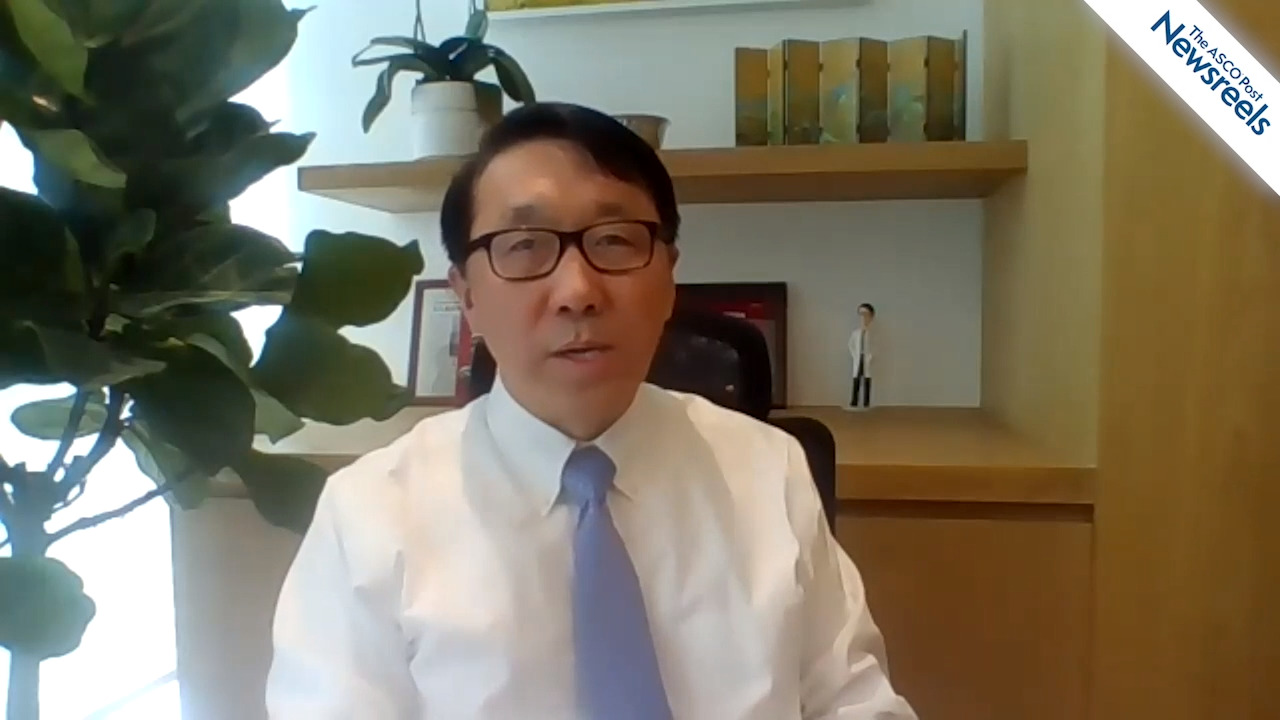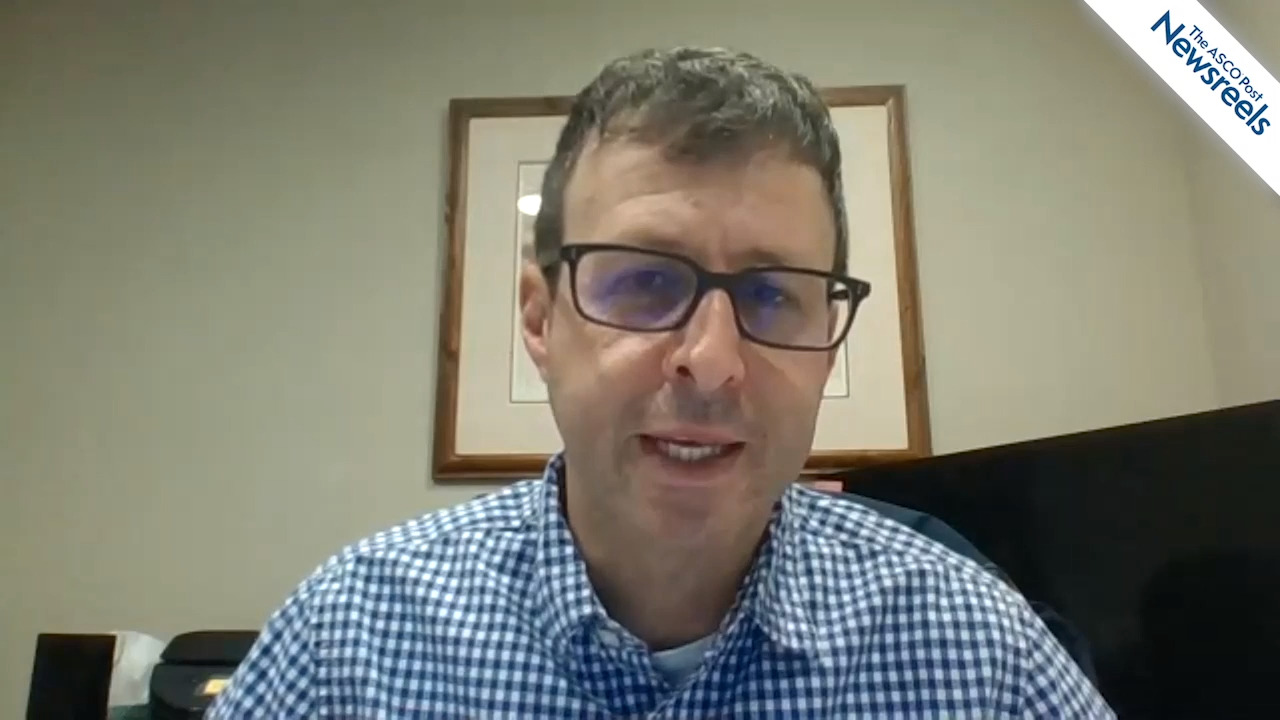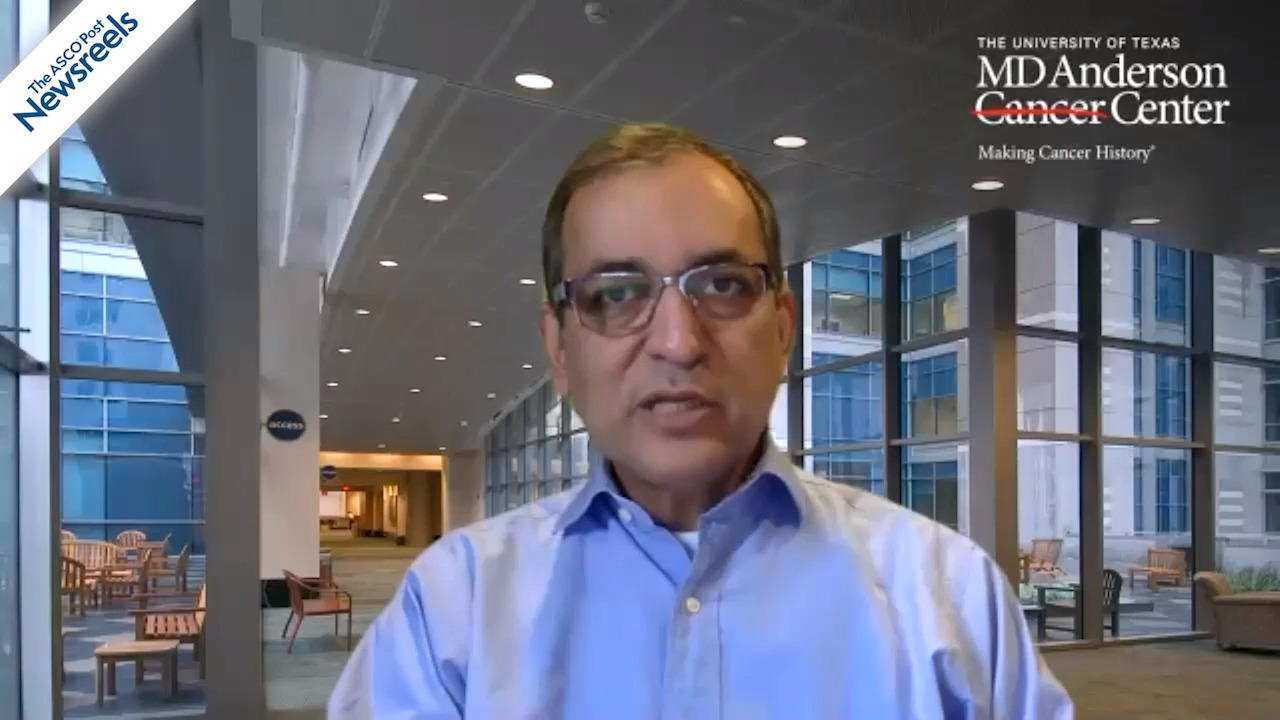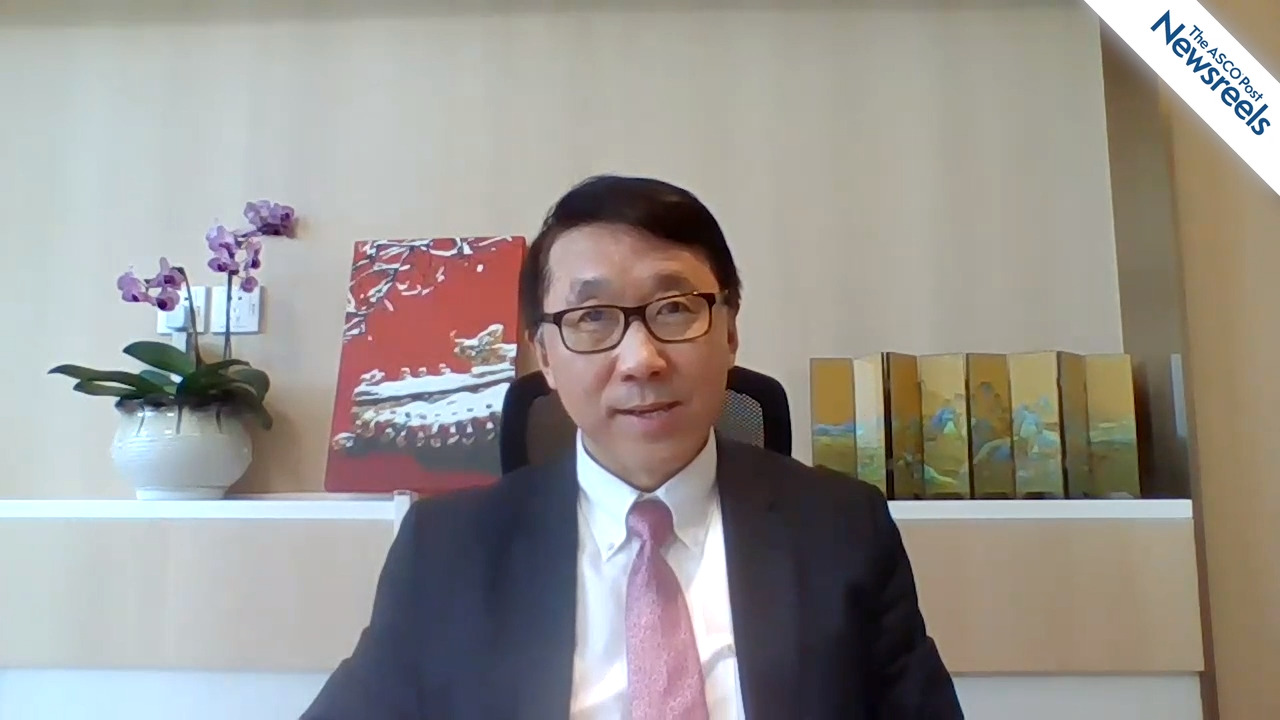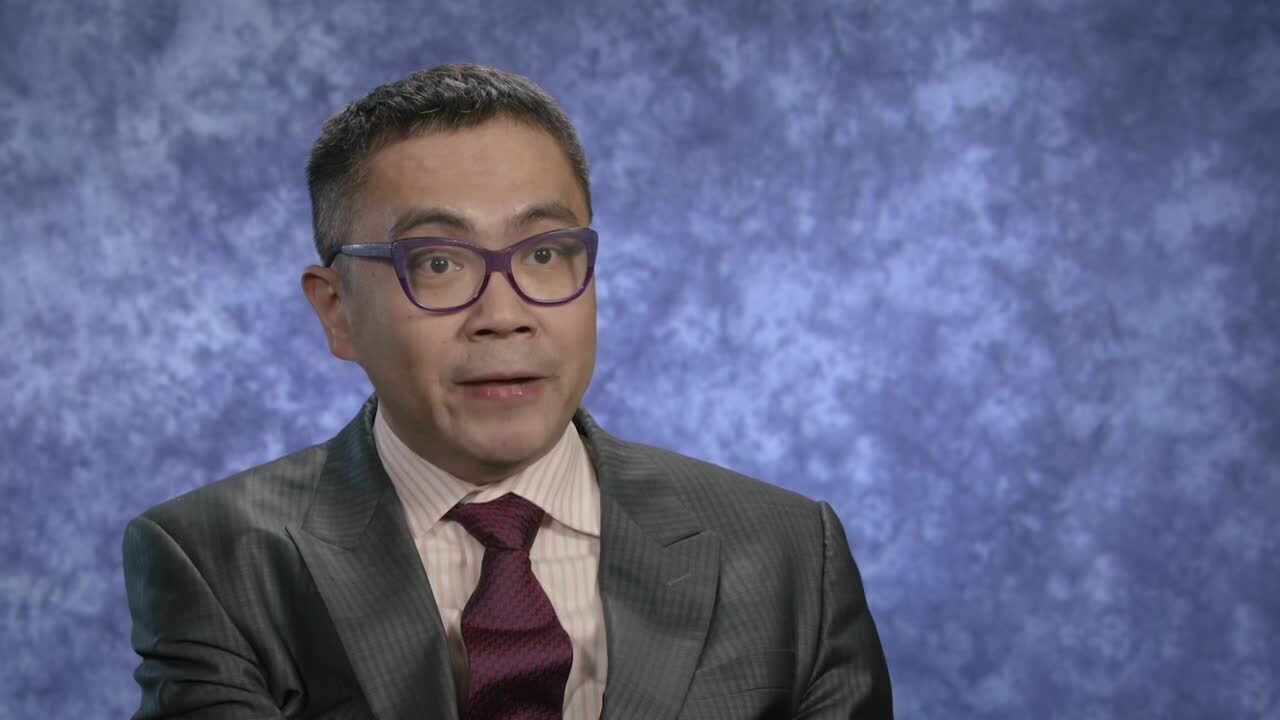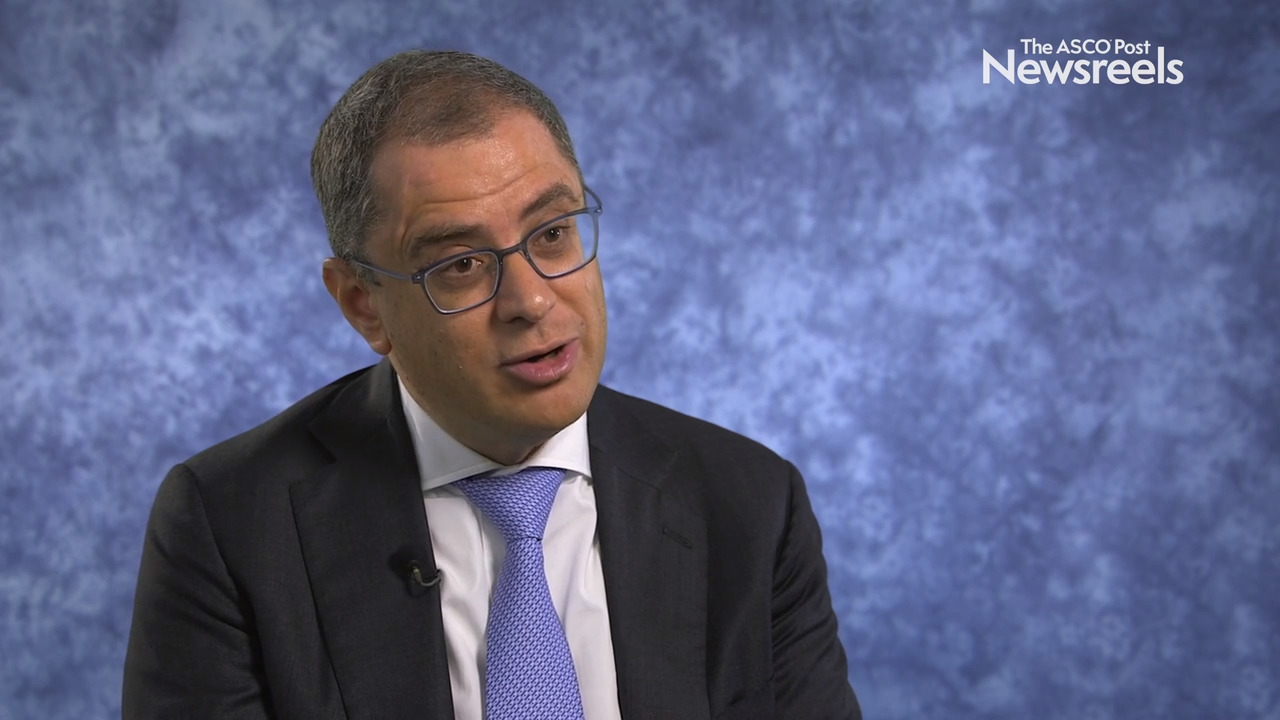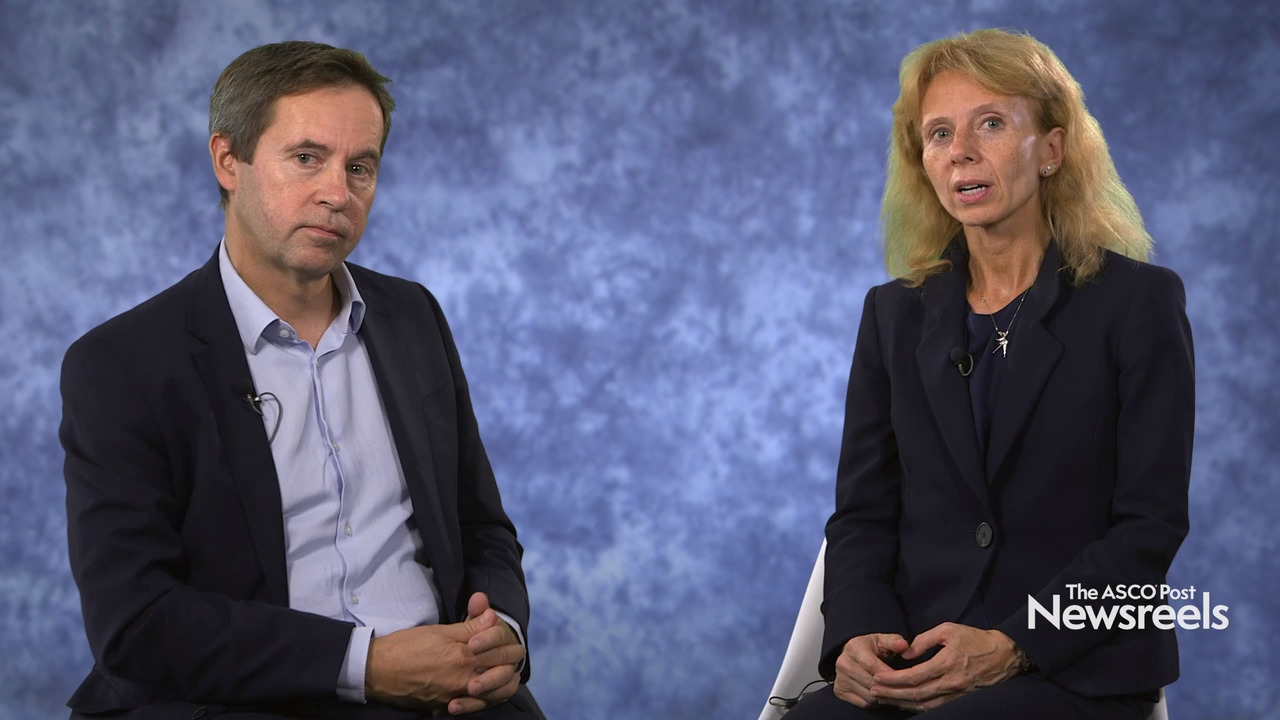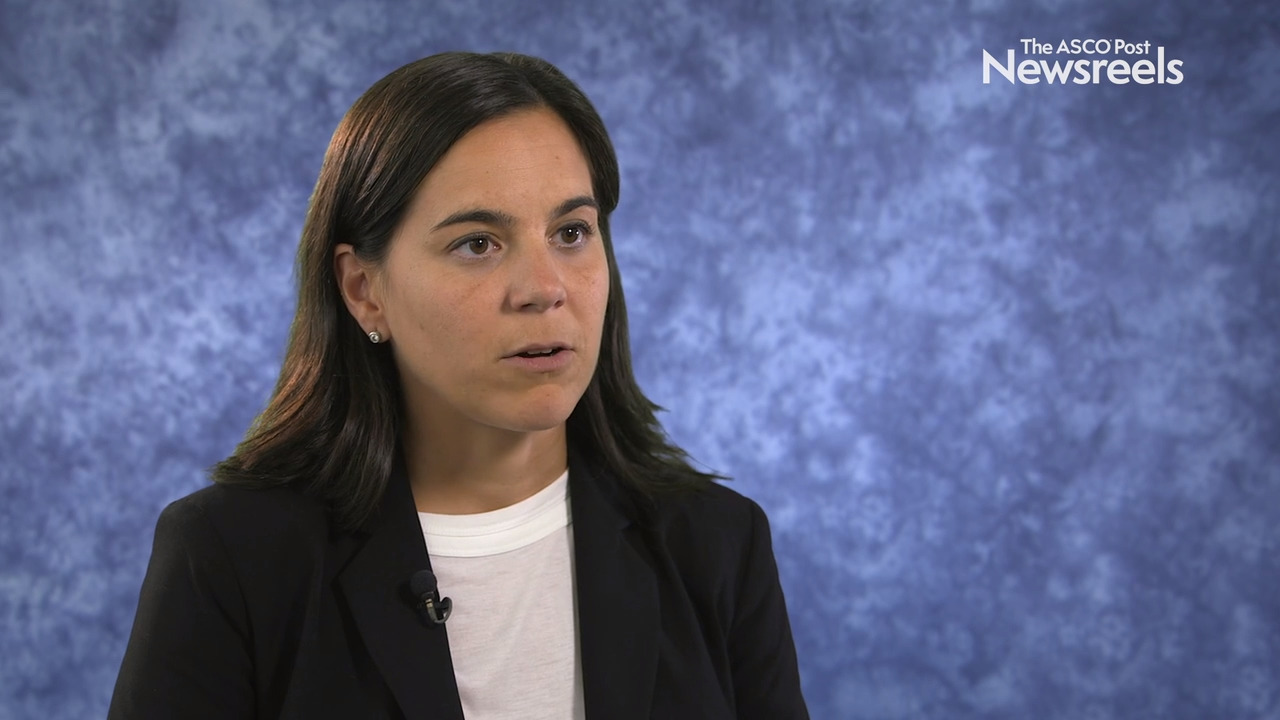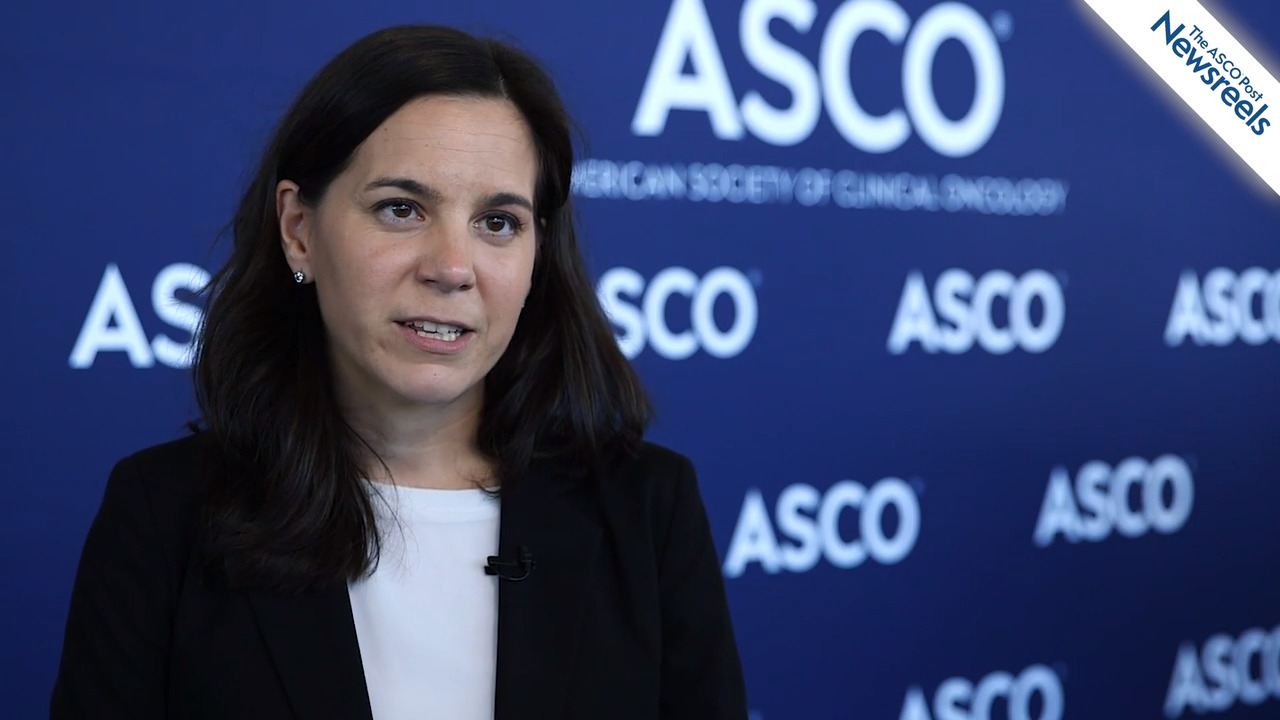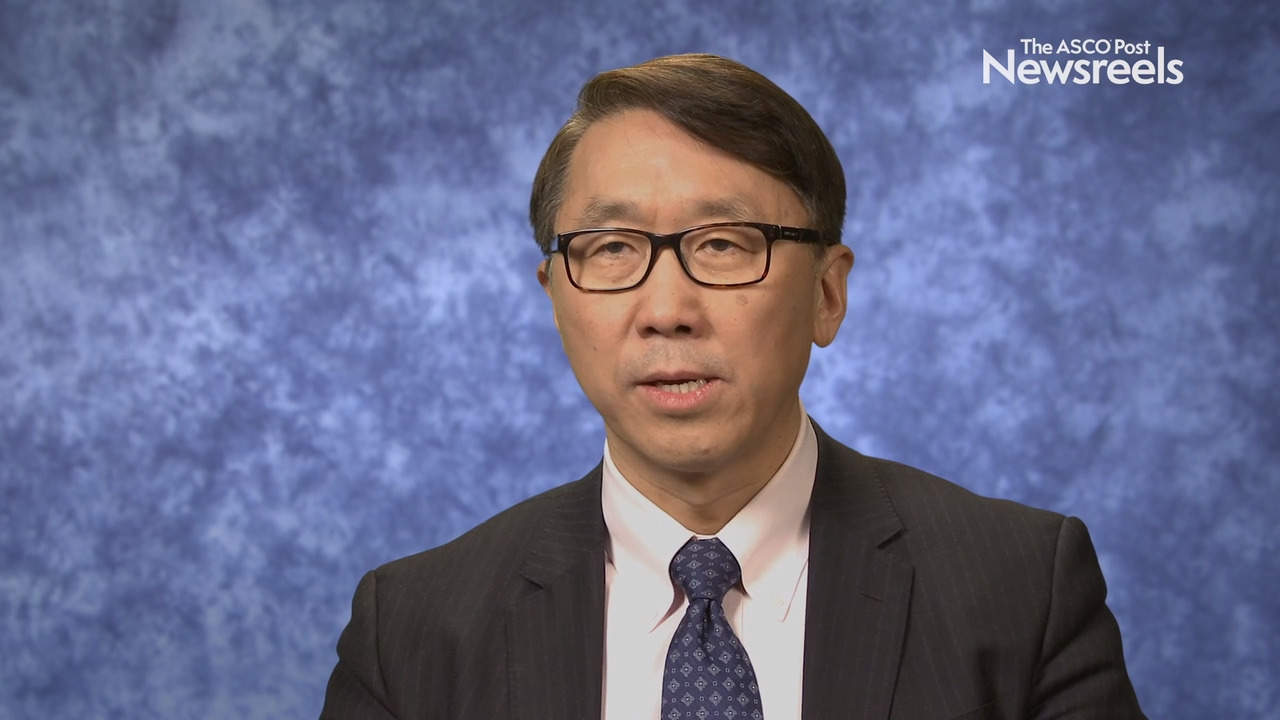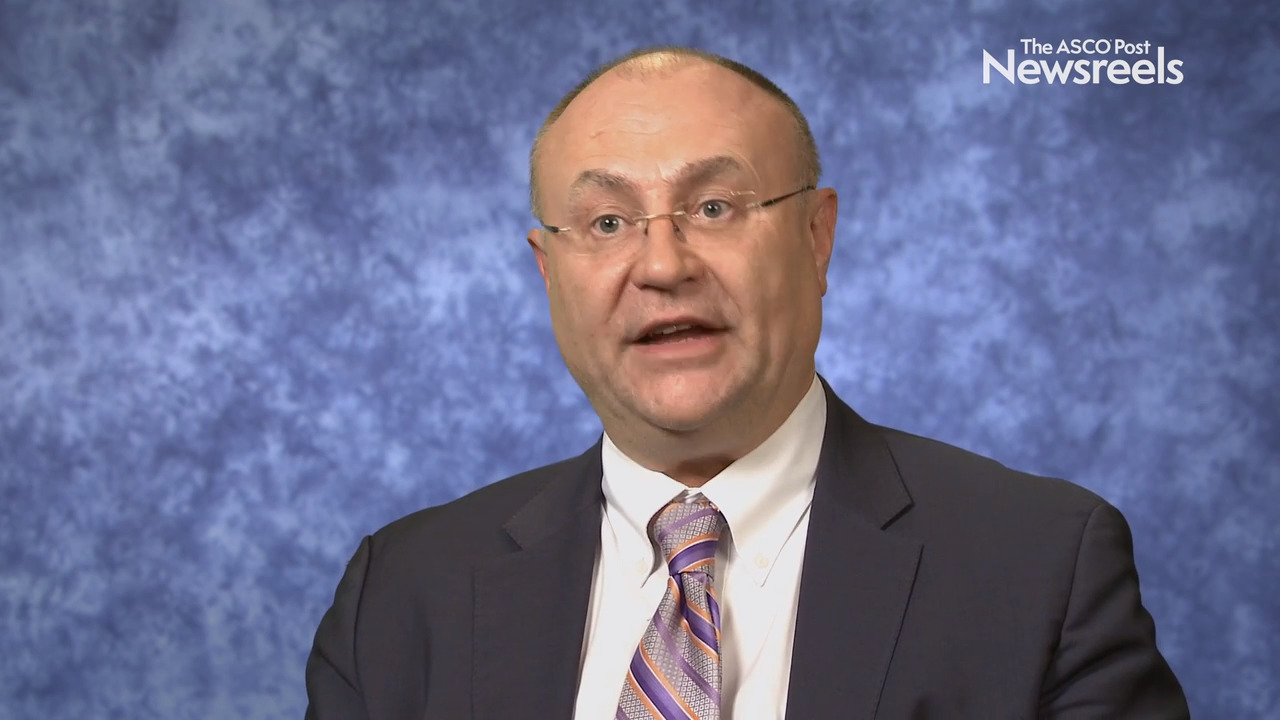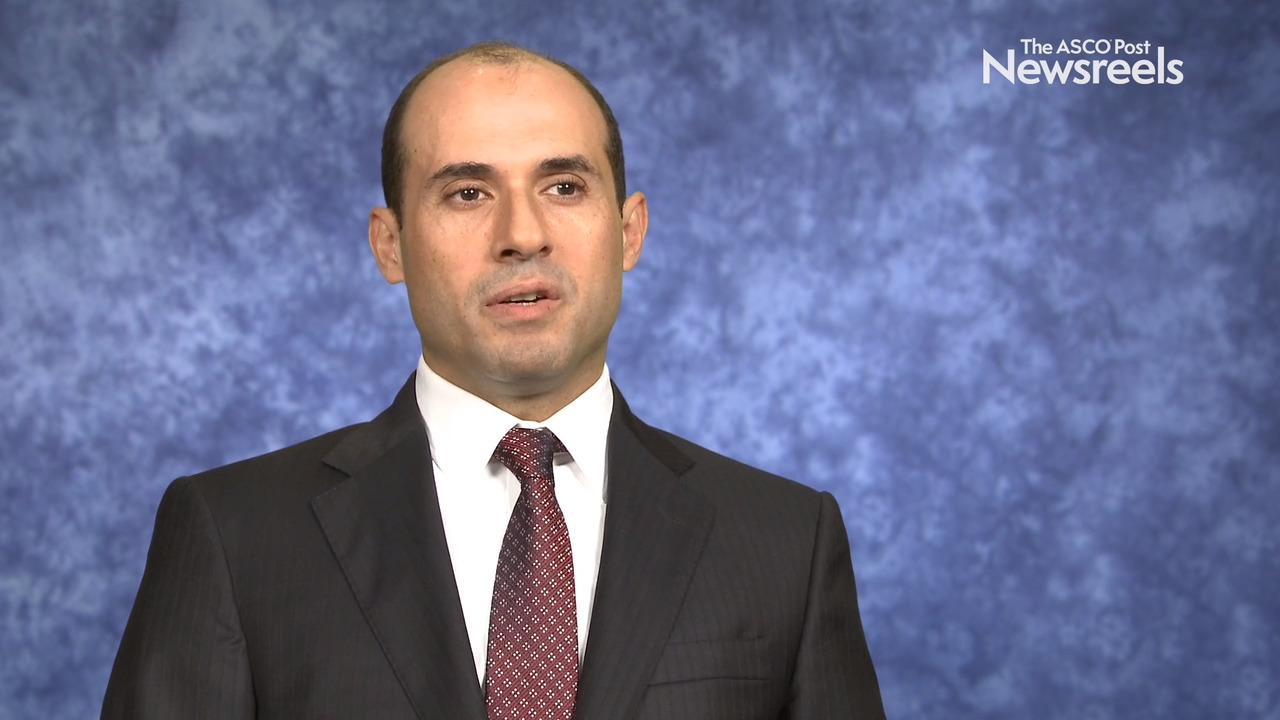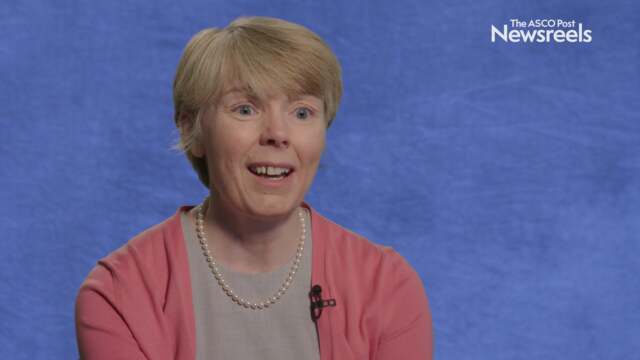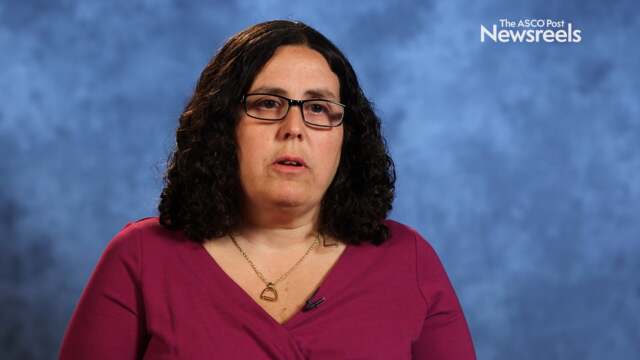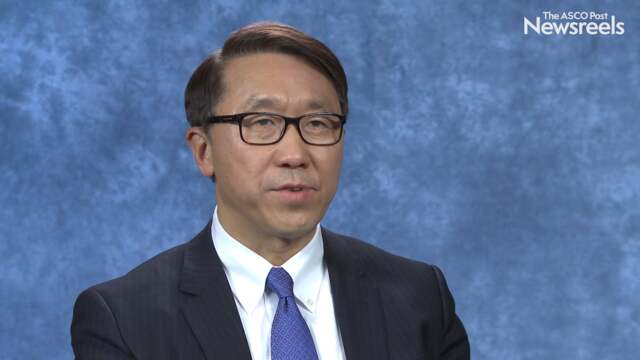Stephen Lam Chan, MD, FRCP, MRCP, on HCC: Pembrolizumab After Resection or Local Ablation
Stephen Lam Chan, MD, FRCP, MRCP, of the Hong Kong Cancer Institute, The Chinese University of Hong Kong, discusses findings from the phase III KEYNOTE-937 trial, which evaluated the efficacy and safety of pembrolizumab vs placebo as adjuvant therapy in patients with hepatocellular carcinoma (HCC) who had undergone surgical resection or local ablation with curative intent (Abstract 477).
Dina Ioffe, MD, on Disparities in HCC: Do They Affect Systemic Care?
Dina Ioffe, MD, of Fox Chase Cancer Center, describes the results of an analysis that sought to determine how race/ethnicity, insurance status, and socioeconomic status may affect patterns of systemic treatment for metastatic hepatocellular carcinoma (HCC) (Abstract 489).
Ghassan K. Abou-Alfa, MD, on Tremelimumab Rechallenge in Unresectable HCC: Safety Outcomes
Ghassan K. Abou-Alfa, MD, of Memorial Sloan Kettering Cancer Center, outlines an assessment of baseline characteristics and safety outcomes in HIMALAYA trial participants who were rechallenged with tremelimumab after being treated with the STRIDE regimen (single dose of tremelimumab plus regular-interval durvalumab) (Abstract 541).
Ghassan K. Abou-Alfa, MD, on a Novel First-Line Regimen for Unresectable HCC Under Study
Ghassan K. Abou-Alfa, MD, of Memorial Sloan Kettering Cancer Center, reviews the goals of the upcoming phase III ARTEMIDE-HCC01 trial, which will examine the efficacy and safety of rilvegostomig (a novel bispecific anti–PD-1/anti-TIGIT antibody) plus bevacizumab with or without tremelimumab as first-line treatment for unresectable hepatocellular carcinoma (Abstract TPS612).
Case 3: Fibrolamellar Hepatocellular Carcinoma
This is Part 3 of First-Line Systemic Treatment of Advanced Hepatobiliary Cancers, a three-part video roundtable series. Scroll down to watch the other videos from this roundtable. In this video, Drs. Laura Goff, Kristen Spencer, and Mark Yarchoan discuss the treatment of fibrolamellar hepatocellular carcinoma. The patient is a 24-year-old woman who presented with a 6-month history of nausea, vomiting, jaundice, and right upper quadrant abdominal pain. Magnetic resonance imaging revealed a large hepatic mass with satellite lesions, biliary involvement, and lymphadenopathy. Biopsy confirmed a DNAJB1-PRKACA fusion, diagnostic of fibrolamellar hepatocellular carcinoma (FLC). In the conversation that follows, the faculty discuss how FLC is distinct from conventional hepatocellular carcinoma and does not follow standard management algorithms. Due to the cancer’s rarity, data are limited, and treatment decisions are often based on case reports or institutional experience. The faculty emphasize the urgent need for clinical trial participation to generate more data, highlighting several treatment approaches that are being explored in early-phase trials, including immunologic and fusion-directed approaches.
Case 2: Advanced Hepatocellular Carcinoma
This is Part 2 of First-Line Systemic Treatment of Advanced Hepatobiliary Cancers, a three-part video roundtable series. Scroll down to watch the other videos from this roundtable. In this video, Drs. Laura Goff, Kristen Spencer, and Mark Yarchoan discuss the treatment of advanced hepatocellular carcinoma. The patient is a 72-year-old man with hepatitis C virus cirrhosis who previously underwent transarterial chemoembolization (TACE) to two hypervascular lesions in the right liver. A follow-up computed tomography scan of the chest showed a new 2-cm right upper lobe lung nodule, which was subsequently biopsied and consistent with metastatic hepatocellular carcinoma. His AFP was 122. In the conversation that follows, the faculty discuss diagnostic and staging considerations for this patient, the role of esophagogastroduodenoscopy, how to choose among first-line immunotherapy doublets, which patients should receive bevacizumab, and the importance of individualizing treatment selection based on patient-specific factors.
Case 1: Metastatic Cholangiocarcinoma
This is Part 1 of First-Line Systemic Treatment of Advanced Hepatobiliary Cancers, a three-part video roundtable series. Scroll down to watch the other videos from this roundtable. In this video, Drs. Laura Goff, Kristen Spencer, and Mark Yarchoan discuss the treatment of metastatic cholangiocarcinoma. The patient is a 45-year-old man who presents with right upper quadrant abdominal pain. Cross-sectional imaging revealed a mass in the lower third of the bile duct that encased the portal vein, common hepatic, and right hepatic arteries. Biopsy confirmed moderately differentiated adenocarcinoma. His CA 19-9 was 598, and bilirubin was 2.4. A CT scan of the chest revealed bilateral pulmonary nodes consistent with metastases. In the conversation that follows, the faculty discuss the role of chemoimmunotherapy in the treatment of metastatic cholangiocarcinoma, the importance of tailoring duration of treatment to individual patient needs, and the still uncertain role of tumor sequencing in the first-line treatment of cholangiocarcinoma.
Maeve Lowery, MD, on a Novel Bifunctional Antibody in Advanced Hepatocellular Carcinoma
Maeve Lowery, MD, discusses the results of the phase II DUBHE-H-308 trial, which evaluated QL1706—a bifunctional antibody consisting of iparomlimab and tuvonralimab—plus bevacizumab and/or chemotherapy in the first-line treatment of advanced hepatocellular carcinoma (Abstract LBA38).
Josep M. Llovet, MD, PhD, on Treatment Options in Hepatocellular Carcinoma
Josep M. Llovet, MD, PhD, presented the results of the LEAP-012 trial during the Presidential Symposium I at the ESMO Congress 2024 (Abstract LBA3). In this brief summary, Dr. Llovet talks further about how management of hepatocellular carcinoma differs across stages.
Josep M. Llovet, MD, PhD, on Intermediate-Stage Hepatocellular Carcinoma: Addition of Lenvatinib Plus Pembrolizumab to TACE
Josep M. Llovet, MD, PhD, presented the results of the phase III LEAP-012 trial, which evaluated the addition of lenvatinib plus pembrolizumab to transarterial chemoembolization (TACE), during the Presidential Symposium I at the ESMO Congress 2024 (Abstract LBA3). For more insights into the treatment of hepatocellular carcinoma, view Dr. Llovet's discussion here.
Ghassan K. Abou-Alfa, MD, MBA, FASCO, and Lorenza Rimassa, MD, on Doublet Immunotherapy Options for Unresectable Hepatocellular Carcinoma
In light of the landmark 5-year overall survival results from HIMALAYA, Ghassan K. Abou-Alfa, MD, MBA, FASCO, of Memorial Sloan Kettering Cancer Center, New York, and Lorenza Rimassa, MD, discuss how to choose among the various doublet immunotherapy options for unresectable hepatocellular carcinoma. For more on the HIMALAYA trial, view part 1 of this discussion.
Ghassan K. Abou-Alfa, MD, MBA, FASCO, and Lorenza Rimassa, MD, on Unresectable Hepatocellular Carcinoma: 5-Year Overall Survival Results From the HIMALAYA Trial
Ghassan K. Abou-Alfa, MD, MBA, FASCO, of Memorial Sloan Kettering Cancer Center, New York, and Lorenza Rimassa, MD, of Humanitas Cancer Center, Milan, discuss the 5-year overall survival results from the phase III HIMALAYA trial evaluating tremelimumab plus durvalumab in unresectable hepatocellular carcinoma (Abstract 947MO). For more on the HIMALAYA trial, view part 2 of this discussion. �
Localized Hepatocellular Carcinoma
This is Part 3 of Immunotherapy Strategies for Hepatobiliary Cancers, a three-part video roundtable series. Scroll down to watch the other videos from this roundtable. In this video, Drs. Rachna T. Shroff, Nilo Azad, and Anthony B. El-Khoueiry discuss the management of localized hepatocellular carcinoma. The patient is a 52-year-old male with a history of hepatitis C virus that has been treated and is in remission. Follow-up surveillance imaging reveals a 5.2-cm liver mass that washes out. His AFP is 6.2, and labs are within normal limits. His ECOG performance status is 1, and he has no history of alcohol or drug use. In the conversation that follows, the faculty discuss the multidisciplinary management of localized hepatocellular carcinoma, whether resection or transplant should be considered, and adjuvant treatment options for high-risk disease.
Advanced Cholangiocarcinoma
This is Part 2 of Immunotherapy Strategies for Hepatobiliary Cancers, a three-part video roundtable series. Scroll down to watch the other videos from this roundtable. In this video, Drs. Rachna T. Shroff, Nilo Azad, and Anthony B. El-Khoueiry discuss the management of advanced cholangiocarcinoma. The patient is a 70-year-old female with no major medical history who presents to the ER after an acute episode of nausea/vomiting and abdominal pain. An MRI reveals a large liver mass with multiple satellite nodules, a hallmark of cholangiocarcinoma. Her labs are within normal limits with the exception of some mild electrolyte abnormalities, and her CA 19-9 is 473. A biopsy of the liver mass reveals moderately differentiated adenocarcinoma that is CK7-positive, CK20-negative, and HepPar1-negative. She presents to oncology for further management, where her physical exam is within normal limits and her ECOG performance status is 0. In the conversation that follows, the faculty discuss next steps in the diagnostic workup of this patient, the role of next-generation sequencing in determining the course of treatment, and current first- and second-line therapies for unresectable cholangiocarcinoma.
Advanced Unresectable Hepatocellular Carcinoma
This is Part 1 of Immunotherapy Strategies for Hepatobiliary Cancers, a three-part video roundtable series. Scroll down to watch the other videos from this roundtable. In this video, Drs. Rachna T. Shroff, Nilo Azad, and Anthony B. El-Khoueiry discuss the management of advanced unresectable hepatocellular carcinoma. The patient is a 67-year-old male with a history of fatty liver disease who presents with abdominal and back pain. Past medical history includes diabetes and hypertension, but no hepatitis. Labs show mild anemia but otherwise normal CBC and chemistries; liver function tests are normal other than mild AST/ALT elevation; and AFP is 47.3. MRI of the abdomen reveals multiple lesions in the liver, and a CT reveals lesions along the spine. The patient presents to oncology for further management, where his physical exam is within normal limits and his ECOG performance status is 1. In the conversation that follows, the faculty discuss current first-line immunotherapy options for hepatocellular carcinoma, including the STRIDE regimen and atezolizumab/bevacizumab; how to balance the risks and benefits of immune checkpoint inhibitors; and what to do after disease progression.
Milind M. Javle, MD, on Cholangiocarcinoma: New Data on Tinengotinib as Monotherapy
Milind M. Javle, MD, of The University of Texas MD Anderson Cancer Center, discusses phase II results on tinengotinib, a next-generation FGFR inhibitor that seems to overcome acquired resistance and shows efficacy in patients with cholangiocarcinoma with other FGFR alterations who are not eligible for FGFR2-targeted treatments. A phase III global study is currently enrolling to further evaluate the efficacy and safety of this agent vs physician’s choice in FGFR-altered, chemotherapy- and FGFR-inhibitor–refractory or relapsed disease.
Riccardo Lencioni, MD, on Hepatocellular Carcinoma: Transarterial Chemoembolization, Durvalumab, and Bevacizumab
Riccardo Lencioni, MD, of the University of Pisa School of Medicine, discusses phase III results from the EMERALD-1 study of durvalumab plus bevacizumab plus TACE (transarterial chemoembolization) in patients with embolization-eligible unresectable hepatocellular carcinoma. Compared with TACE alone, this combination is the first immune checkpoint inhibitor–based regimen to improve progression-free survival and has the potential to set a new standard of care in this disease, according to Dr. Lencioni (Abstract LBA432).
R. Katie Kelley, MD, on Biliary Tract Cancer: Data From KEYNOTE-966 on Pembrolizumab, Gemcitabine, and Cisplatin
R. Katie Kelley, MD, of the Helen Diller Family Comprehensive Cancer Center at the University of California, San Francisco, discusses phase III findings of the KEYNOTE-966 study, which showed that adding the immune checkpoint inhibitor pembrolizumab to gemcitabine and cisplatin improved overall survival in patients with untreated metastatic or unresectable biliary tract cancer. (Abstract CT008)
Pierce K.H. Chow, PhD, MBBS, on Hepatocellular Carcinoma: New Data From the IMbrave050 Trial of Atezolizumab, Bevacizumab, and Active Surveillance
Pierce K.H. Chow, PhD, MBBS, of the National Cancer Centre, Singapore and Duke-NUS Medical School, discusses phase III findings showing that, for patients with hepatocellular carcinoma at high risk of disease recurrence, adjuvant therapy with atezolizumab plus bevacizumab after resection or thermal ablation was more effective than active surveillance. According to Dr. Chow, these results could lead to reassessment of surgical resection in this disease. (Abstract CT003)
Laura A. Dawson, MD, on Hepatocellular Carcinoma: Phase III Data on Sorafenib vs Stereotactic Body Radiation Therapy
Laura A. Dawson, MD, of Canada’s Princess Margaret Cancer Centre, discusses phase III findings from the NRG/RTOG1112 study, which showed that stereotactic body radiation therapy (SBRT) administered prior to sorafenib vs sorafenib alone, improved outcomes in patients with advanced hepatocellular carcinoma. SBRT may become a new standard treatment option for patients with locally advanced disease, especially in the presence of macrovascular invasion (Abstract 489).
Laura A. Dawson, MD, on Hepatocellular Carcinoma and Liver Metastases: Recent Treatment Data on Palliative Radiotherapy
Laura A. Dawson, MD, of Canada’s Princess Margaret Cancer Centre, discusses phase III findings showing that compared with best supportive care alone, single-fraction whole-liver radiation therapy appears to improve hepatic pain in the majority of patients with treatment-refractory or -ineligible hepatocellular carcinoma or liver metastases. In addition, the data indicated a trend for improved 3-month survival with radiation therapy (Abstract LBA492).
Richard S. Finn, MD, on HCC: Tislelizumab vs Sorafenib, and Their Impact on Quality of Life
Richard S. Finn, MD, of the David Geffen School of Medicine at the University of California, Los Angeles, discusses findings from the RATIONALE-301 study, which showed that patients with unresectable hepatocellular carcinoma (HCC) treated with first-line tislelizumab had better health-related quality-of-life outcomes compared with those treated with sorafenib, particularly in terms of fatigue and physical functioning. These results, along with the effects on overall survival, response rate, and a favorable safety profile, support the benefit of tislelizumab as a potential first-line treatment option in this patient population (Abstract 495).
Rachna T. Shroff, MD, on Biliary Tract Cancers: Recent Findings on Use of Gemcitabine, Cisplatin, and Nab-paclitaxel
Rachna T. Shroff, MD, of the University of Arizona Cancer Center, discusses phase III results from the SWOG 1815 study, which compared gemcitabine, cisplatin, and nab-paclitaxel vs gemcitabine and cisplatin in patients with newly diagnosed, advanced biliary tract cancers. Although adding nab-paclitaxel to gemcitabine and cisplatin did not improve median overall survival in this population, exploratory analyses in patients with locally advanced disease or gallbladder cancer suggest potential clinical utility in these settings, which may warrant further evaluation (Abstract LBA490).
Treatment of AJCC Stage IV Intrahepatic Cholangiocarcinoma
This is Part 4 of Updates in Hepatobiliary Cancer, a four-part video roundtable series. Scroll down to watch the other videos from this Roundtable. In this video, Drs. Ghassan Abou-Alfa, Richard Finn, and Rachna Shroff discuss the treatment of AJCC stage IV intrahepatic cholangiocarcinoma. The patient is a 60-year-old woman with stage IV metastatic cholangiocarcinoma and an FGFR2 fusion on next-generation sequencing. The faculty discuss treatment options for this patient, reviewing the results of the TOPAZ-1 trial, which established durvalumab plus gemcitabine/cisplatin as standard of care. They discuss targeted approaches in cholangiocarcinoma, including the FGFR2 inhibitors pemigatinib, infigratinib, and futibatinib, and highlight considerations for emerging therapies.
Adjuvant Therapy in Biliary Tract Cancer
This is Part 3 of Updates in Hepatobiliary Cancer, a four-part video roundtable series. Scroll down to watch the other videos from this Roundtable. In this video, Drs. Ghassan Abou-Alfa, Richard Finn, and Rachna Shroff discuss the role of adjuvant therapy in biliary tract cancer. The patient is a 52-year-old man who is diagnosed with intrahepatic cholangiocarcinoma with one positive periportal lymph node. Surgical resection reveals a 7.2-cm, pT3aN0 stage III mass. Following surgery, the patient has recovered well and is not experiencing symptoms. The faculty discuss the next steps for this patient in a rapidly evolving field: adjuvant capecitabine, gemcitabine plus capecitabine, or imagine surveillance alone? In addition, they explore the possibility of perioperative or neoadjuvant approaches in biliary tract cancer.
Second-Line Therapy and Beyond in Hepatocellular Carcinoma
This is Part 2 of Updates in Hepatobiliary Cancer, a four-part video roundtable series. Scroll down to watch the other videos from this Roundtable. In this video, Drs. Ghassan Abou-Alfa, Richard Finn, and Rachna Shroff discuss second-line therapy and beyond in hepatocellular carcinoma. The patient is a 63-year-old man with a history of nonalcoholic fatty liver disease who was diagnosed with hepatocellular carcinoma metastatic to the lungs and perihepatic and retroperitoneal lymph nodes. He had no response to atezolizumab plus bevacizumab after 2 months of therapy and now has experienced progression of disease in multifocal lung nodules as well as new right adrenal metastases. The faculty discuss next steps for a patient such as this, highlighting key data for second- and third-line therapy in hepatocellular carcinoma. They also discuss whether there is a role for immunotherapy re-challenge in patients who experience disease progression after immune checkpoint inhibition.
Front-Line Therapy in Metastatic Hepatocellular Carcinoma
This is Part 1 of Updates in Hepatobiliary Cancer, a four-part video roundtable series. Scroll down to watch the other videos from this Roundtable. In this video, Drs. Ghassan Abou-Alfa, Richard Finn, and Rachna Shroff discuss front-line therapy in metastatic hepatocellular carcinoma. The patient is a 71-year-old woman with a history of hepatitis C, now cured, who presents to the emergency department with severe right-sided, upper-quadrant pain. Computed tomography reveals a 10-cm right liver mass, 10 bilateral lung nodules of up to 2.5 cm, and a 1-cm bone lesion. The faculty debate the need for biopsy for hepatocellular carcinoma in a patient such as this. They also discuss factors to consider when choosing first-line therapy in patients with metastatic hepatocellular carcinoma, reviewing the findings of recent studies such as IMbrave150, HIMALAYA, and LEAP-002. Editor’s Note: This discussion was filmed prior to the approval of tremelimumab plus durvalumab for the first-line treatment of unresectable hepatocellular carcinoma.
Richard S. Finn, MD, on Hepatocellular Carcinoma: Recent Data on Lenvatinib Plus Pembrolizumab
Richard S. Finn, MD, of the Geffen School of Medicine at the University of California, Los Angeles, discusses primary phase III results from the LEAP-002 study of pembrolizumab, an anti–PD-1 therapy, plus lenvatinib, the orally available multiple receptor tyrosine kinase inhibitor, vs lenvatinib monotherapy in patients with advanced hepatocellular carcinoma (Abstract LBA34).
Akihiro Ohba, MD, on Biliary Tract Cancer: New Findings on Fam-Trastuzumab Deruxtecan-nxki
Akihiro Ohba, MD, of Japan’s National Cancer Center Hospital, discusses phase II data from the HERB trial on fam-trastuzumab deruxtecan-nxki, which showed activity in patients with HER2-expressing unresectable or recurrent biliary tract cancer (Abstract 4006).
Anthony B. El-Khoueiry, MD, on Hepatocellular Carcinoma: Expert Perspective on Novel Additive Strategies
Anthony B. El-Khoueiry, MD, of the University of Southern California, Norris Comprehensive Cancer Center, discusses two key phase III studies of first-line treatment in hepatocellular carcinoma: the LAUNCH trial, which explored lenvatinib combined with transarterial chemoembolization for advanced disease; and the HIMALAYA trial, which studied tremelimumab and durvalumab for unresectable disease. The latter trial may represent a new standard of care, according to Dr. El-Khoueiry.
Ghassan K. Abou-Alfa, MD, MBA, on Hepatocellular Carcinoma: Open-Label Trial of Tremelimumab and Durvalumab
Ghassan K. Abou-Alfa, MD, MBA, of Memorial Sloan Kettering Cancer Center and Weill Medical College at Cornell University, discusses phase III results of the HIMALAYA trial, which showed the combination of a single priming dose of tremelimumab added to durvalumab is superior to sorafenib for patients with unresectable hepatocellular carcinoma (Abstract 379).
Nilofer Saba Azad, MD, on Novel Treatment Combinations Under Study in Biliary Tract Cancers
Nilofer Saba Azad, MD, of Johns Hopkins Sidney Kimmel Cancer Center, assesses the findings from the phase III TOPAZ-1 trial, a study of durvalumab in combination with gemcitabine plus cisplatin in patients with advanced biliary tract cancer. Dr. Azad explains why the study sets a potential new standard of care of gemcitabine plus cisplatin and durvalumab in unselected patients.
Lipika Goyal, MD, on Treating Intrahepatic Cholangiocarcinoma With Futibatinib
Lipika Goyal, MD, of Massachusetts General Hospital, discusses phase II results of the FOENIX-CCA2 trial, which explored the clinical benefit of futibatinib, an FGFR1–4 inhibitor, tested in patients with intrahepatic cholangiocarcinoma that harbored FGFR2 gene fusions or other rearrangements (Abstract CT010).
Richard S. Finn, MD, on Treating Hepatocellular Carcinoma With Atezolizumab, Bevacizumab, and Sorafenib
Richard S. Finn, MD, of UCLA Medical Center, discusses updated efficacy and safety data from the IMbrave150 trial of patients receiving atezolizumab plus bevacizumab vs sorafenib as first-line treatment for unresectable hepatocellular carcinoma (Abstract CT009).
Andrew X. Zhu, MD, PhD, on IDH1-Mutant Cholangiocarcinoma: Ivosidenib vs Placebo
Andrew X. Zhu, MD, PhD, of Massachusetts General Hospital, discusses final results from the phase III ClarIDHy study, which showed that ivosidenib may improve overall and progression-free survival compared with placebo in patients with previously treated cholangiocarcinoma and an isocitrate dehydrogenase 1 mutation (Abstract 266).
Richard S. Finn, MD, on HCC: Atezolizumab Plus Bevacizumab vs Sorafenib
Richard S. Finn, MD, of the UCLA Medical Center, discusses updated results from the IMbrave 150 study, which showed atezolizumab plus bevacizumab provides the longest overall survival seen in a front-line phase III study in advanced hepatocellular carcinoma, confirming this combination as the standard of care for patients with previously untreated, unresectable disease (Abstract 267).
Milind M. Javle, MD, on Cholangiocarcinoma: Treatment With Infigratinib
Milind M. Javle, MD, of The University of Texas MD Anderson Cancer Center, discusses phase II study results showing that the novel tyrosine kinase inhibitor infigratinib may prove to be effective in treating patients with advanced cholangiocarcinoma harboring an FGFR2 gene fusion or rearrangement (Abstract 265).
Andrew X. Zhu, MD, PhD, on Hepatocellular Carcinoma: Atezolizumab Combined With Bevacizumab
Andrew X. Zhu, MD, PhD, of Massachusetts General Hospital, discusses an exploratory analysis seeking to identify tumor-based molecular biomarkers that may be associated with clinical response or resistance to the combination treatment of atezolizumab and bevacizumab in patients with advanced hepatocellular carcinoma (Abstract CT044).
Thomas Yau, MBBS, on Advanced Hepatocellular Carcinoma: CheckMate 040 Trial of Nivolumab, Ipilimumab, and Cabozantinib
Thomas Yau, MBBS, of the University of Hong Kong, discusses this triplet combination, which yielded better responses than doublet combination therapy in patients with advanced liver cancer, but with more severe adverse events and more treatment discontinuations (Abstract 478).
Peter R. Galle, MD, on Atezolizumab/Bevacizumab vs Sorafenib for Hepatocellular Carcinoma: Patient-Reported Outcomes
Peter R. Galle, MD, of the University Medical Center, Mainz, discusses patient-reported outcomes from this phase III study, which showed the combination of atezolizumab plus bevacizumab vs sorafenib is well tolerated and may represent a new standard of care in the first-line setting for unresectable liver cancer (Abstract 476).
Ghassan K. Abou-Alfa, MD, MBA, on Cholangiocarcinoma: ClarIDHy Trial of Ivosidenib vs Placebo
Ghassan K. Abou-Alfa, MD, MBA, of Memorial Sloan Kettering Cancer Center, discusses phase III study findings showing improvement in progression-free survival among patients with an isocitrate dehydrogenase 1 (IDH1) mutation who received ivosidenib compared with a similar group that received placebo (Abstract LBA10).
Tim Meyer, PhD, and Lorenza Rimassa, MD, on Advanced Hepatocellular Carcinoma: CELESTIAL Trial of Cabozantinib
Tim Meyer, PhD, of the University College London, and Lorenza Rimassa, MD, of Humanitas Research Hospital, Milan, discuss their phase III findings on prognostic and predictive factors of cabozantinib vs placebo in previously treated liver cancer, and outcomes based on clinical characteristics and plasma biomarkers in the advanced setting (Abstracts 749P & 678PD).
Angela Lamarca, MD, PhD, on Liver Metastases From Intrahepatic Cholangiocarcinoma
Angela Lamarca, MD, PhD, of the Christie NHS Foundation Trust, discusses findings from a study that showed new staging criteria should be considered for patients diagnosed with liver metastases in the absence of other extrahepatic tumor spread (Abstract 731P).
Angela Lamarca, MD, PhD, on Biliary Tract Cancers: Active Symptom Control With Oxaliplatin and Fluorouracil
Angela Lamarca, MD, PhD, of The Christie NHS Foundation Trust and the University of Manchester, discusses phase III findings from a multicenter study of active symptom control alone or active symptom control with oxaliplatin and fluorouracil for patients with locally advanced or metastatic biliary tract cancers previously treated with cisplatin and gemcitabine (Abstract 4003).
Andrew X. Zhu, MD, PhD, on Liver Cancer: Outcomes in the REFLECT Study on Lenvatinib
Andrew X. Zhu, MD, PhD, of the Massachusetts General Hospital Cancer Center, discusses an analysis of survival and objective response in patients with hepatocellular carcinoma who took part in a phase III study of lenvatinib (Abstract 186).
Heinz-Josef Lenz, MD, on BRAF V600E–Mutated Biliary Tract Cancer: Results From the ROAR Basket Trial
Heinz-Josef Lenz, MD, of the University of Southern California Norris Comprehensive Cancer Center, discusses the efficacy and safety of dabrafenib and trametinib in patients with BRAF V600E–mutated biliary tract cancer (Abstract 187).
Ahmed Omar Kaseb, MD, on Liver Cancer: Results From an Immunotherapy Trial
Ahmed Omar Kaseb, MD, of The University of Texas MD Anderson Cancer Center, discusses phase II study findings on nivolumab alone vs nivolumab plus ipilimumab in patients with resectable hepatocellular carcinoma (Abstract 185).
Eileen M. O’Reilly, MD, on Hepatobiliary Cancer: Multimodality Approaches
Eileen M. O’Reilly, MD, of Memorial Sloan Kettering Cancer Center, discusses the latest information on locoregional and systemic treatments of hepatocellular carcinoma as well as targeted therapy for biliary cancer.
Anne M. Covey, MD, on HCC: Screening and Diagnosis Updates
Anne M. Covey, MD, of Memorial Sloan Kettering Cancer Center, discusses the latest recommendations for screening and diagnosing hepatocellular carcinoma, an aggressive tumor marked by increasing incidence in the United States and a poor 5-year survival rate.
Andrew X. Zhu, MD, PhD, on HCC: Results From KEYNOTE-224
Andrew X. Zhu, MD, PhD, of Massachusetts General Hospital, discusses study findings on pembrolizumab in patients with advanced hepatocellular carcinoma previously treated with sorafenib (Abstract 209).
